
|
#946 (4/13/23)

|
|
BY TONY FOURNIER |
|
Imperial artists included in Part Two of this article are Fats Domino, Cecil Gant, Lil' Son Jackson, T-Bone Walker, Smiley Lewis, Mary Wallace, Big Jay McNeeley, Joe Houston, and Tommy Ridgley. |
LEWIS CHUDD — OWNER AND PRESIDENT OF IMPERIAL RECORDS
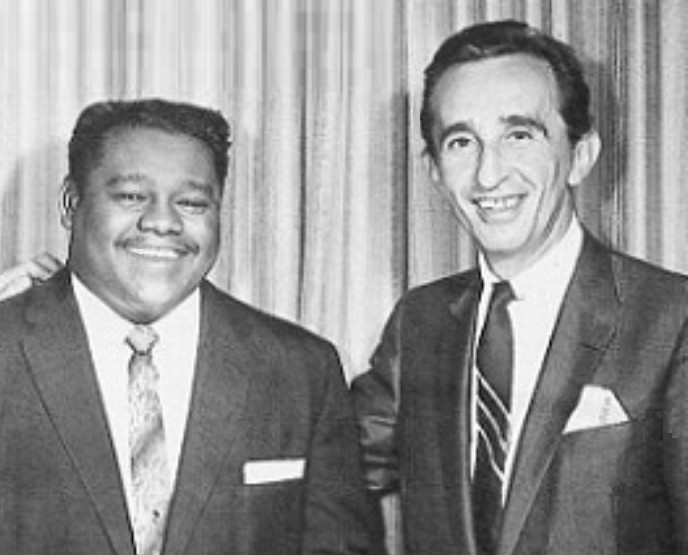
|
Above: Photo of Fats Domino and Lew Chudd.
As mentioned in Part One of this article, Fats Domino was Imperial's heart and soul for many years starting in 1950.
THE IMPERIAL RECORDS STORY (PART THREE)
(CASH BOX, October 5, 1957)....Says Chudd, "To sell a million records in those days, with music that was not nationally acceptable, and with artists who were unknown, was like selling the proverbial icebox in Alaska. But I knew we had a commodity that would sell with the right exposure."
Exposure was the key to selling records then, and it is now. Chudd still uses the identical methods today to launch a record. While Chudd was barnstorming the country selling Fats Domino to the public, he was also selling him to club owners and dance halls.
He arranged for the proper agents to handle Fats and soon "Fat Man" and a host of other rocking tunes came bursting out of night clubs from New Orleans to Chicago, from Los Angeles to New York. Dancers packed the ballrooms to jitterbug and shuffle to the swinging singing and playing of Fats Domino and his Band.
The hit-making trio of Fats, writer-arranger Dave Bartholomew, and sales-promoter Chudd began to churn out more million record recordings, "Please Don't Leave," "Going Home," "How Long," "Little School Girl," and "Poor Poor Me."
"The most important way for a record artist to sell consistently year in and year out," says Chudd, "is to keep before the public eye. Fats' success on records is due mostly to the fact that he never stops working. He has rarely taken mort than one or two weeks off during a year since I've known him.
He plays clubs, concerts and dances in every city in the United States. And more recently, television and motion pictures have added to his exposure. Fats probably has more first-name friends in his audiences than any other entertainer." (...to be continued)
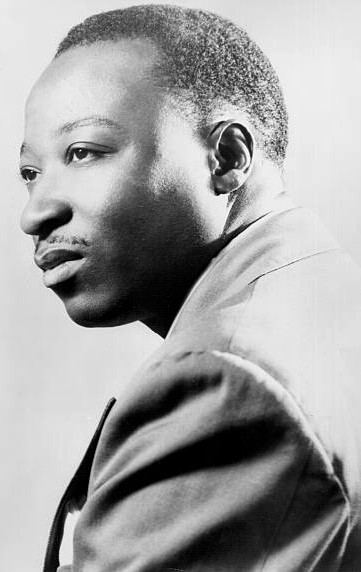
DAVE BARTHOLOMEW
FATS DOMINO
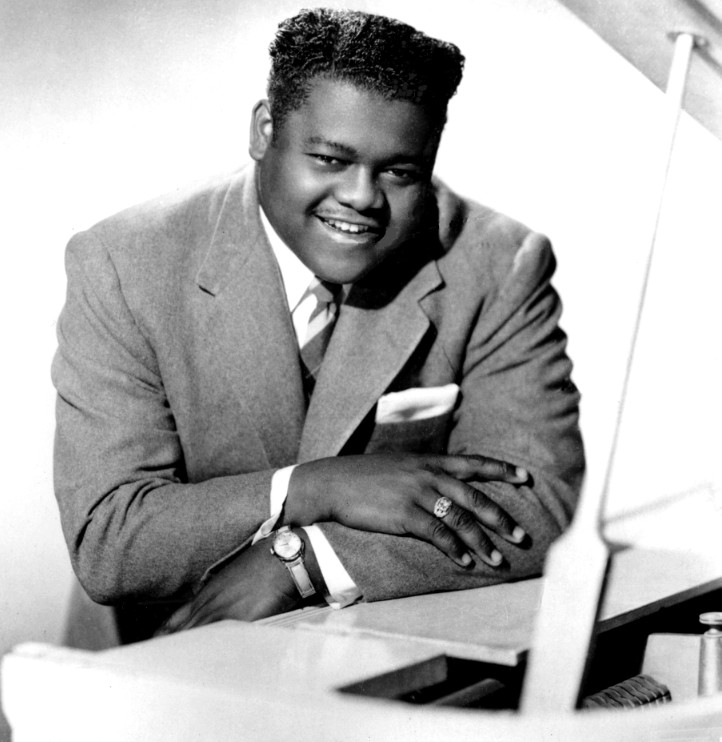
|
Above: Photo of Fats Domino. In the three years 1951-1953, he had thirteen records issued on the Imperial label. His many fans would wait and watch for each new record to be released, so they could buy them.
MOREHOUSE ENTERPRISE (Bastrop, LA), October 9, 1951:
BAND LEADER TELLS HOW HE BEGAN AND BECAME THE FAMOUS "FAT MAN"
"I first began playing the piano by ear or sound," spoke Fats Domino, band leader and recording ace for the Imperial Recording company in Los Angeles, Calif.
"Many times I would sit down at my mother's piano and begin to fool around with the keys, but," he laughed, "my brother would run in the house and push me away from the piano."
"Every time I heard a tune that I liked I would buy the record and play until I got it down pat. Several persons heard me and that's more or less how I got started."
The youthful blues stylist, who is married and has three children, got his first playing assignment with Billy Diamond. It was here that he was labeled "Fats" by Diamond and the name has stuck with him since.
Later, the up-and-coming musician played with Roy Brown and sat in on a Joe Turner's recording of "Story To Tell", which has since gone over big among blues lovers. (NOTE: "Story To Tell" can be heard in Imperial Records - Part One.)
Joe Turner told the "easy going" Fats that he was the closest person to sound like the great Pete Johnson that he had ever heard. Many other people claim that he sounds like Amos Milburn. There might be a touch of some of these great pianists in his versions but the Fat Man has a styling all of his own.
The band leader has a deep appreciation for what Diamond did for him. Concerning his present promoter, Melvin Cade, Fats stated, "He is the finest that I have ever had."
The likable pianist likes to play anywhere there is a good piano. This was his first trip to Bastrop. While playing at the Hide-Away club in New Orleans, several recording agents heard him and asked him to do a recording.
After about four days of debating on what to cut on his disc, the Fat Man finally rigged up the "Fat Man", which has since become a best selling blues number.
Nothing has ever worried Fats since he began in the early part of 1949. However, he is thinking a lot about his concert engagement in the City auditorium in Atlanta, Ga., Oct. 22. Following the concert he will appear in a battle of music with Roy Brown and Ruth Brown that night in the auditorium.
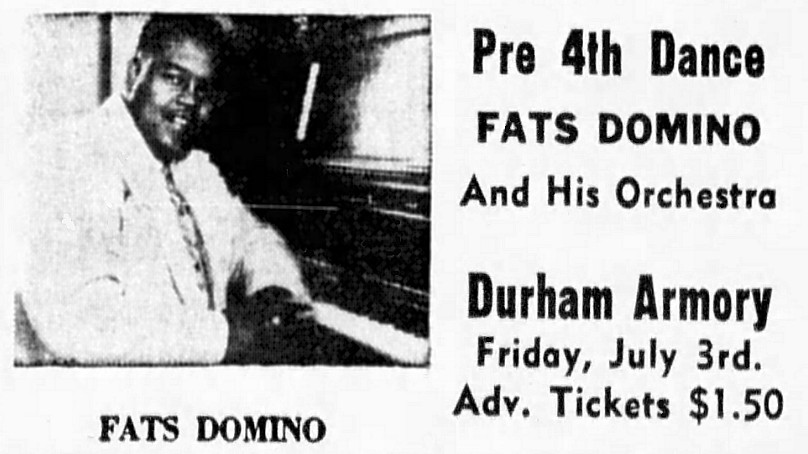
DURHAM MORNING HERALD, JULY 2, 1953
Above: Photo of Fats Domino. In the three years 1951-1953, he had thirteen records issued on the Imperial label. His many fans would wait and watch for each new record to be released, so they could buy them.
MOREHOUSE ENTERPRISE (Bastrop, LA), October 9, 1951: (On the same page as the above article.)
FATS DOMINO SENDS LOCAL BLUES LOVERS WITH UNIQUE STYLINGS
"They Call Me The Fat Man" "Every Night About This Time."
Fats Domino, writer and recorder of those smash hits, and his orchestra, thrilled local blues lovers and dancers with his jump arrangements of blues and ballads at the Golden Slipper night spot Friday night. The popular 23-year-old pianist first got his start in his home town, New Orleans.
The clever fingerwork of the "88" specialist delighted the dancers as they roared with loud approval. It's no small wonder because Fats is a tireless worker who strives for perfection. His soon to be released "Rain Is Falling," Rocking Chair" and the "Fat Man Theme" proved to be as good as his past recordings.
(NOTE: "Rockin' Chair" is the only one of these that was actually released.)Throughout his present tour so far, which has carried the musical aggregation to the Palace Park in Shreveport, Graystone Grill in Alexandria, and the Blue Night Club in Opelousas, the sensational blues-ters have been terrific, according to booking agent Melvin Cade, another Orleanian who operates Club Rocket in the crescent city.
The band, which was formed about seven months ago, consists of six members. Cornelius Coleman, a flashy drummer; Robert Hagans, mellow tenor sax man; Walter Nelson, the strumming guitarist; E. Wendell, alto sax; and Little Sunny, a "groovey" vocalist, are the headliners in the Orleanian band.
Following his engagement here, Fats and his crew moved on to Texarkana for another one "night" stand.
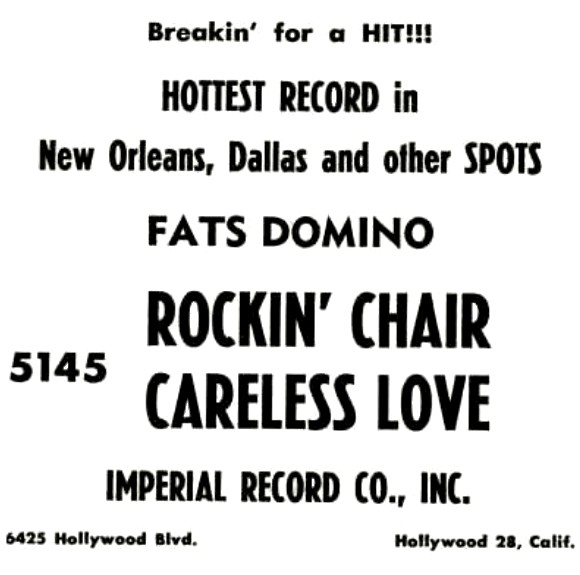
THE BILLBOARD, October 20, 1951
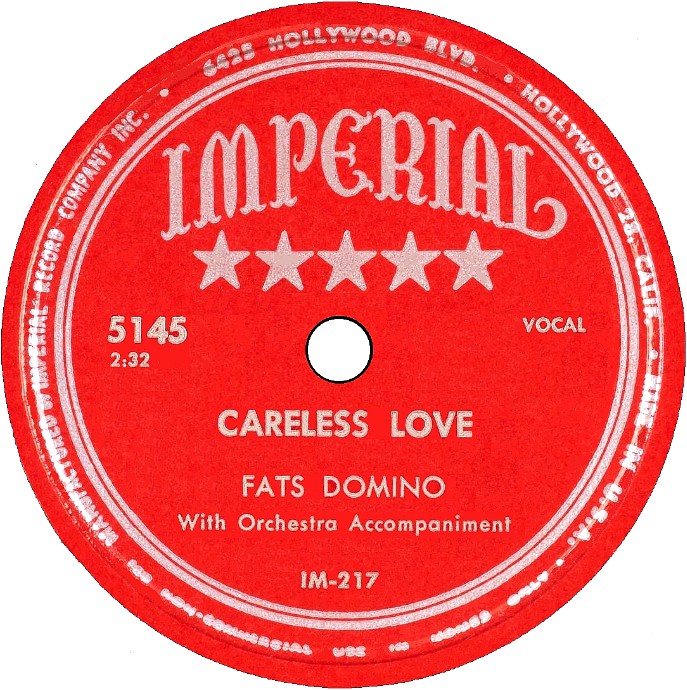
|
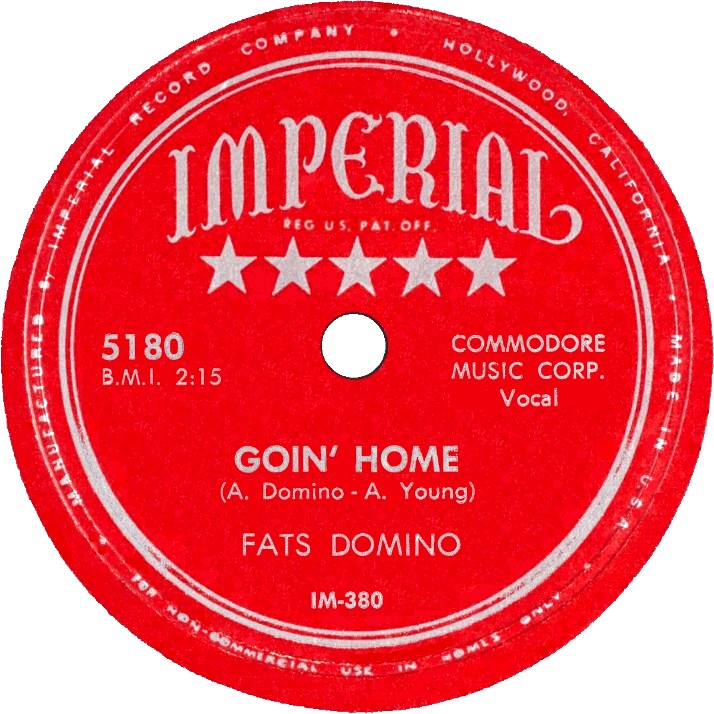
|
Above Left: Label image for Imperial 5145, released in 1951. Note that no composer is shown on the label. The flip-side is "Rockin' Chair". Antoine Domino and Al Young are shown as composers on that label. Young was an A&R man for Imperial. This combination composed many other Fats Domino songs, including "Goin' Home". Above Right: Label image for Imperial 5180, released in 1952. The flip-side is "Reeling And Rocking", another "A. Domino-A. Young" composition. The song starts "Well, I bought my rockin' chair...." The ending seems contrived to ensure a two minute plus length.
Cash Box Review (4/26/52):
FATS DOMINO — Imperial 5180
Reeling And Rocking/Goin' Home A slow jump is given a rocking Fats Domino treatment and the result is a strong side. Fats' slick singing makes this a side his devotees will go for. The rollicking tune is sold in sock style by the chanter who is potently backed by the ork. Flip is a slow beat item executed forcefully by the singer and the musical aggregation.LISTEN (Windows Media Player):
1. "Careless Love" - Fats Domino - Imperial 5145 - 1951.
2. "Rockin' Chair" - Fats Domino - Imperial 5145 - 1951.
3. "Goin' Home" - Fats Domino - Imperial 5180 - 1952.
4. "Reeling And Rocking" - Fats Domino - Imperial 5180 - 1952.ALL FOUR SONGS played in sequence.
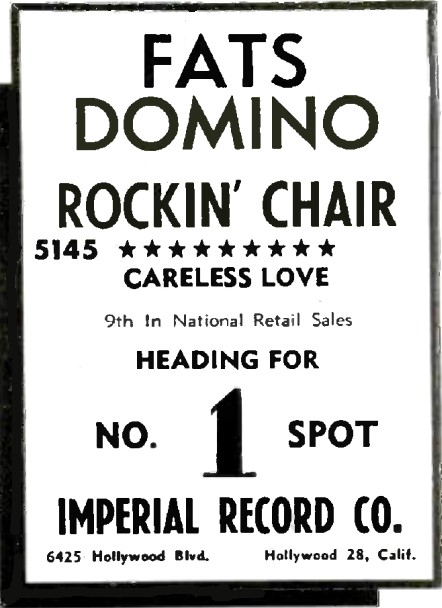
|
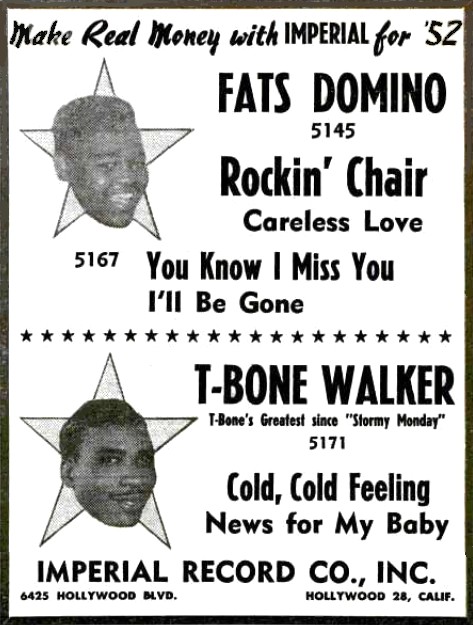
|
Above Left: THE BILLBOARD, January 5, 1952.
NOTE: At the time of this Imperial advertisement, the record was not in any of Billboard's Top Ten lists.Above Right: THE BILLBOARD, February 9, 1952.
NOTE: Fats Domino's picture looks more like "Skinny" Domino. T-Bone Walker and "Cold Cold Feeling" are covered further down this webpage.
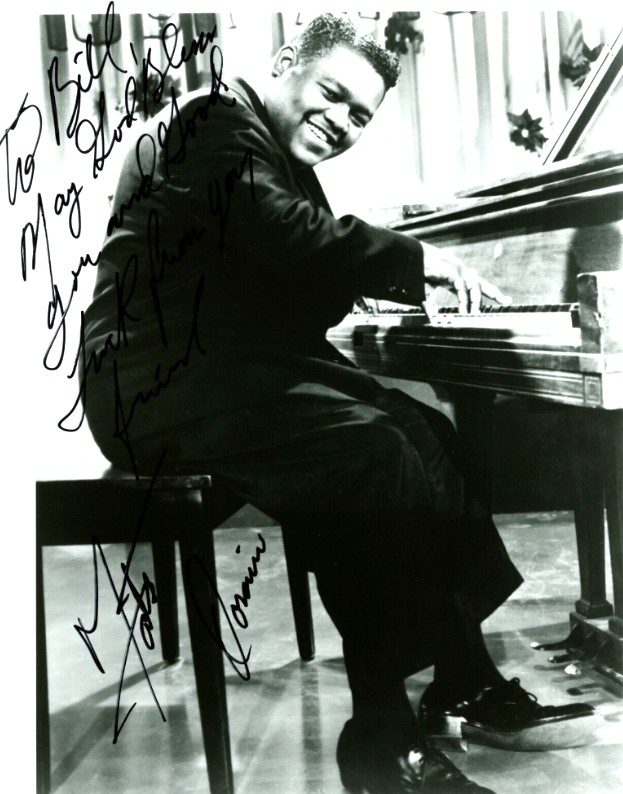
|
Above: Autographed photo of Fats Domino.
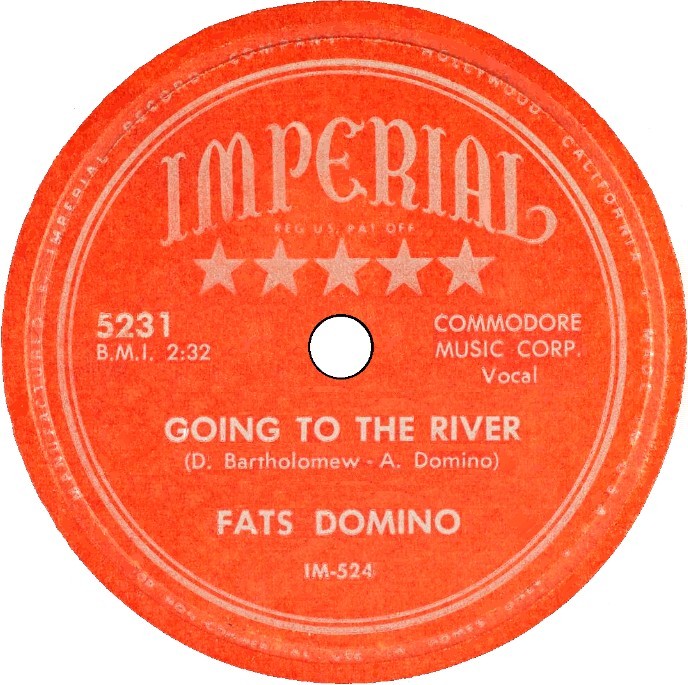
|
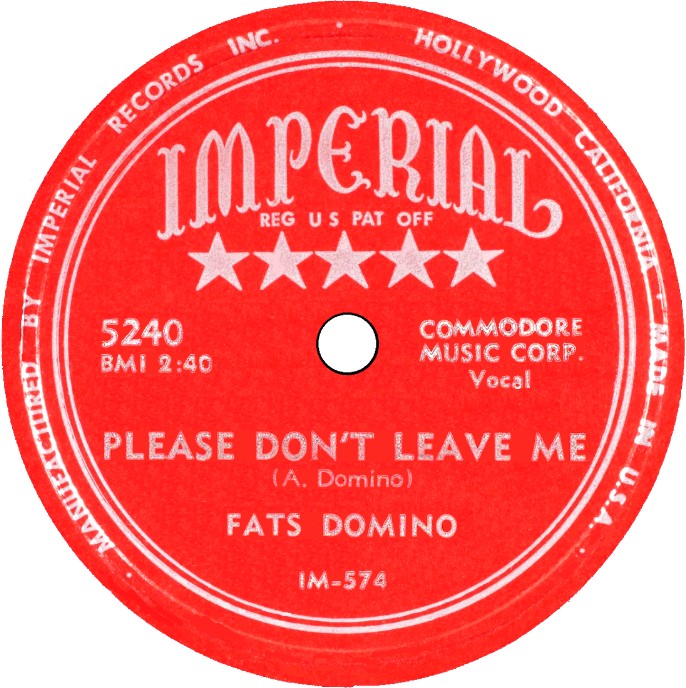
|
Above Left: Label image for Imperial 5231, released in 1953. Dave Bartholomew was involved in composing many of Fats' sides. That includes the 1955/1956 hits "Don't You Know", "Ain't It A Shame", "Poor Me", "Bo Weevil", "Don't Blame It On Me", "I'm In Love Again", "So Long", and "Blue Monday". Above Right: Label image for Imperial 5240, released in 1953.
LISTEN (Windows Media Player):
1. "Going To The River" - Fats Domino Imperial 5231 - 1953.
2. "Please Don't Leave Me" - Fats Domino - Imperial 5240 - 1953.BOTH SONGS played in sequence.
CASH BOX, May 16, 1953:
....The Fats Domino etching of "Goin' To The River" appears to be climbing higher and higher in rhythm and blues circles. Always a consistent record selling artist, this should prove to be one of Fats' best....CASH BOX, May 16, 1953:
....Lew Buckley, Buckley's One Stop, Nashville, quotes Lew Chudd, Imperial president, as telling him that "Going To The River" by Fats Domino will go all the way before long....CASH BOX, June 6, 1953:
....Fats Domino, whose "Goin' To The River" is No. 3 according to The Cash Box R&B Top Ten, has begun a Midwestern tour. Into Dayton for four days, followed by a series of one-niters....THE BILLBOARD, October 3, 1953: IMPERIAL RENEWS DOMINO FOR 9 YEARS
HOLLYWOOD—Rhythm and blues recording artist Fats Domino has renewed his contract with Imperial Records for a nine-year term to run thru 1962. Domino, with three releases in "Please, Don't Leave Me"; "Rosemary"; and "Poor, Poor Me" currently on the market, has sold over two million records in his four years' association with the Imperial plattery, according to prexy Lew Chudd.
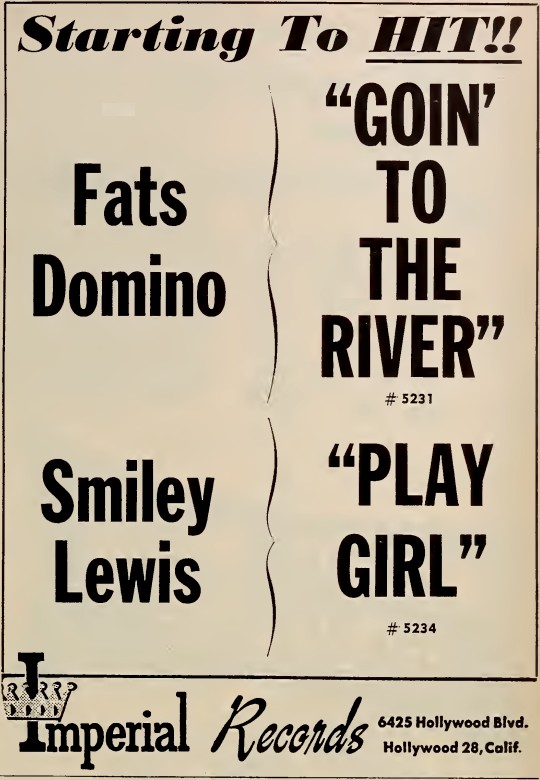
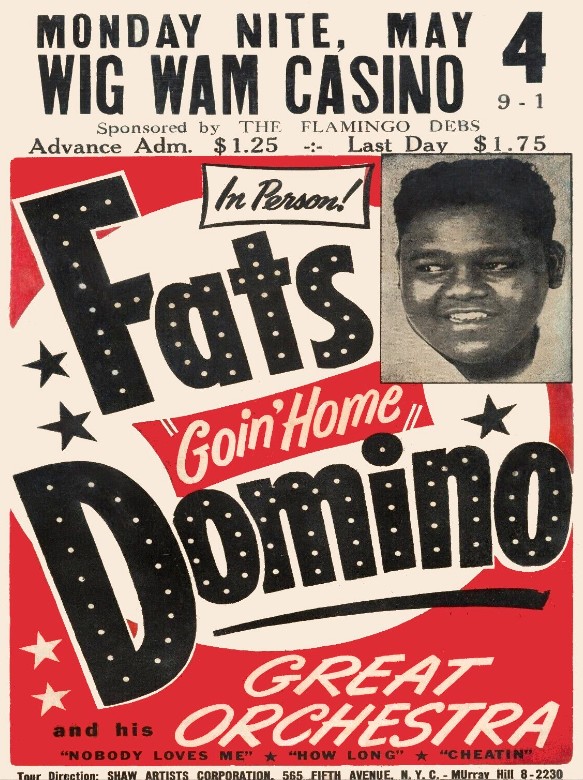
Above Left: CASH BOX, April 15, 1953.
(NOTE: Smiley Lewis is featured further down this webpage.)Above Right: Fats Domino poster from May 1953. The Wig Wam Casino was located in Waldorf, MD.
EXTRA RECORD — GOING TO THE RIVER
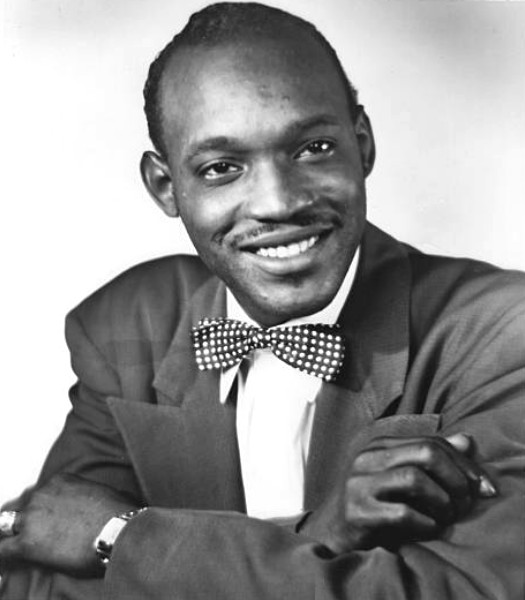
|
Above: Chuck Willis, from Atlanta, GA, was a singer and songwriter. He recorded for Columbia's subsidiary label, OKeh, in the early 1950s. He then moved to Atlantic Records where he had several hits, including "C.C. Rider" and "What Am I Living For?".
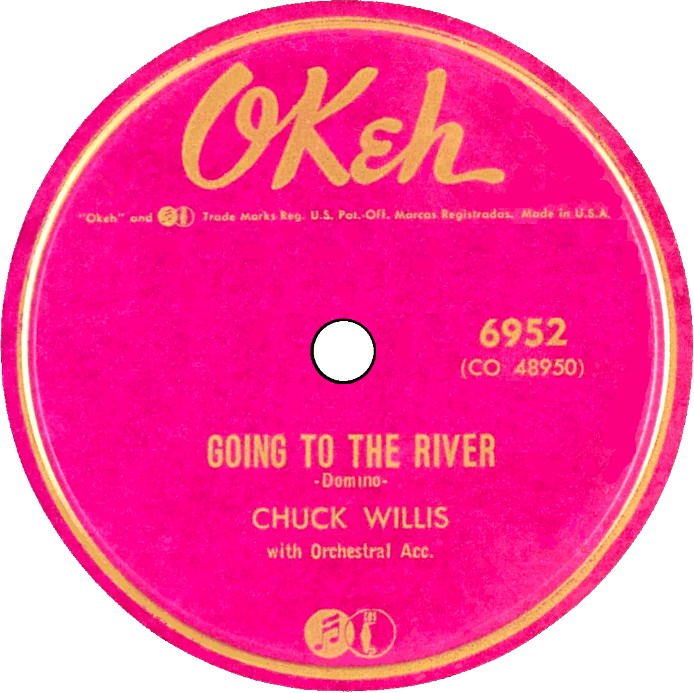
|
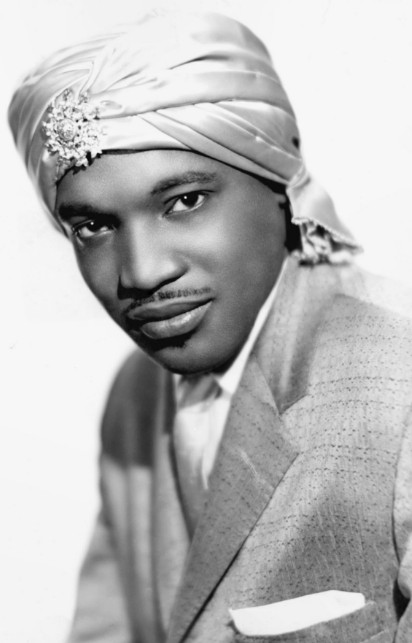
|
Above Left: Label image for OKeh 6952, released in 1953. Here Chuck Willis sings a Fats Domino composition. But Chuck was a well-renowned songwriter himself. Three of his compositions, "Oh What A Dream" (Ruth Brown backed by The Drifters), "The Door Is Still Open" (The Cardinals), and "Close Your Eyes" (The Five Keys), are among my favorites. Above Right: Photo of Chuck Willis.
The Billboard Review (4-11-53):
CHUCK WILLIS — OKeh 6952
Going To The River (78) Here's a good one by the warbler. Tune Is a slow, melodic blues, and Willis sings it with heart and feeling as he tells of his plans to do away with himself. The band supports him with a beat. A strong side that could grab coin with exposure.
(NOTE: Ratings had a range of 0-100 with 70-79 considered as "good".)LISTEN (Windows Media Player):
"Going To The River" - Chuck Willis - OKeh 6952 - 1953.
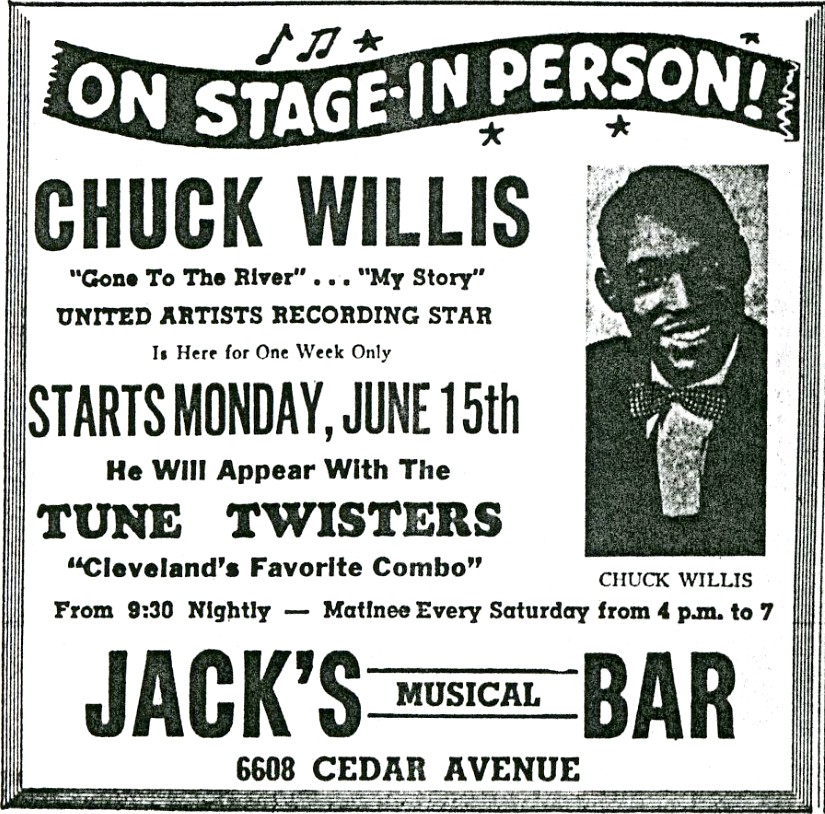
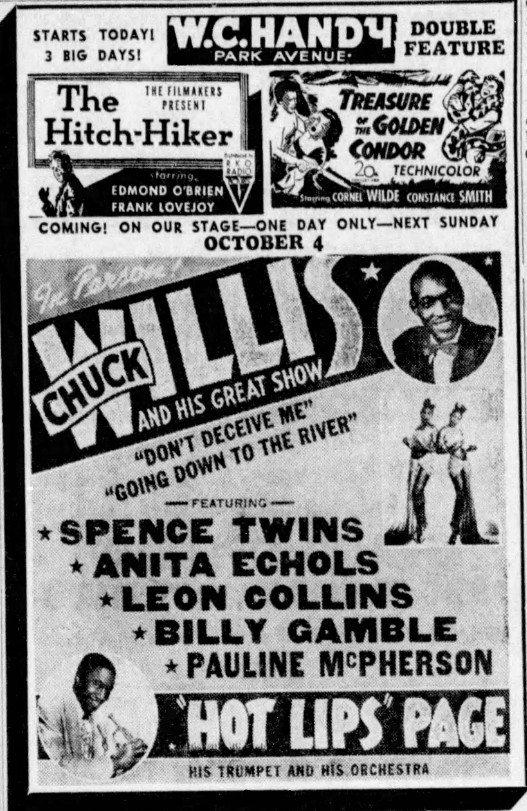
Above Left: CLEVELAND CALL AND POST, June 1953. [This clipping provided by Richard Koloda.] Above Right: COMMERCIAL APPEAL (Memphis, TN), September 27, 1953.
(Hey! To both of the ad-designers of the above: the song's title is "Going To The River".)
ARTISTS WITH RECORDS ON IMPERIAL'S 5000 R&B SERIES (1951-1952)
(Imperial Records - Part One includes a list of artists through 1950)
Fats Domino
Big Jay McNeeley And His Orchestra
Jesse Belvin
Three Dots And A Dash
T-Bone Walker
Lloyd Glenn And His Joymakers
Mercy Dee
Lil' Son Jackson
Eddie Johnson And His Orchestra
Monte Easter And His Orchestra
Smiley Lewis
Ernie Andrews And His Orchestra
Eddie "Guitar" Slim And His Playboys
Ray Lewis And The Four Bars
Dan Grissom
The Meadowlarks
James Wayne
Mary Wallace
Herb Fisher
Joe Houston
Smilin' Joe
Tommy Ridgley
Dave Bartholomew
CECIL GANT
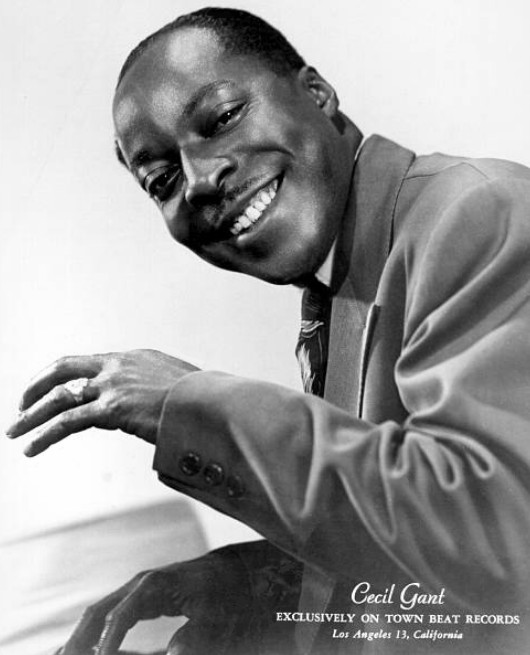
|
Above: Photo of Cecil Gant, also known as "Pvt. Cecil Gant". He was a singer, piano player, songwriter, and orchestra leader. In 1944/1945, he came on the scene with a huge hit, "I Wonder". Sadly, he had only six more years to enjoy his fame. Cecil had many records on many different labels, including Gilt-Edge, 4-Star, Bullet, Globe, Dot, King, Swing Time, Decca, and Imperial. His big hit, "I Wonder", came out on at least four different labels. His contractual obligations became a legal quagmire.
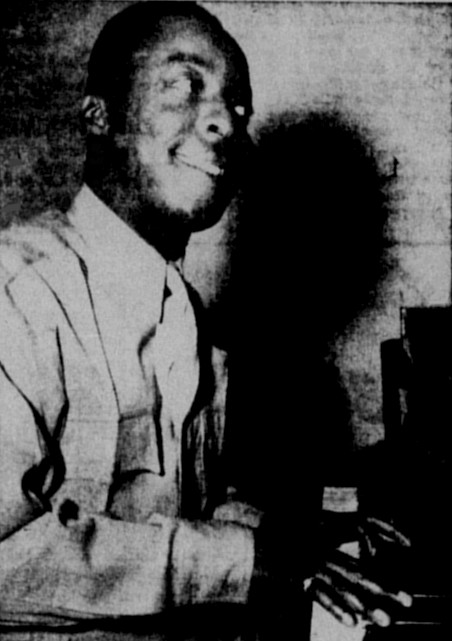
|
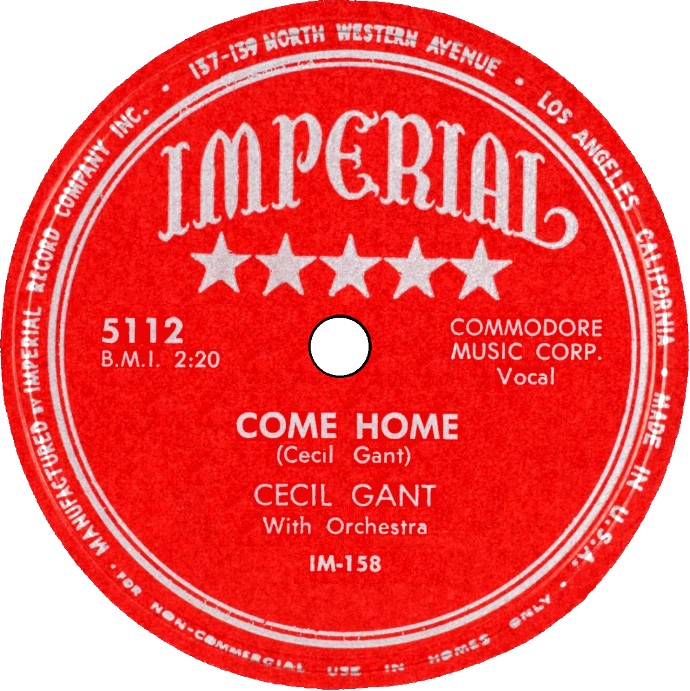
|
Above Left: DETROIT TRIBUNE, March 2, 1946:
PVT. CECIL GANT—Headlining the Paradise stage show this week will be the All-Time All-American Trumpet King, Roy Eldridge and his orchestra and Pvt. Cecil Gant, sensational recording star of "I Wonder" fame....Above Right: Label image for Imperial 5112, released in 1950. This is the second of two records Cecil had on the Imperial label, both released in 1950. The flip-side is "Blues By Cecil". Labels show Cecil Gant as composer on both sides.
LISTEN (Windows Media Player):
1. "Come Home" - Cecil Gant - Imperial 5112 - 1950.
2. "Blues By Cecil" - Cecil Gant - Imperial 5112 - 1950.BOTH SONGS played in sequence.
EXTRA RECORDS — CECIL GANT
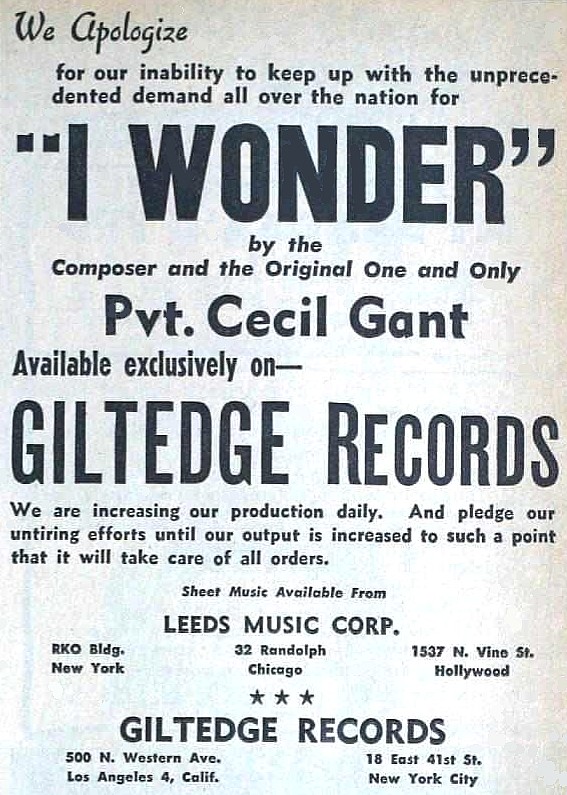
|
Above: THE BILLBOARD, March 10, 1945.
(NOTE: The above claim is totally honest. "I Wonder" took off like wildfire when it was released, taking Gilt-Edge by surprise. About a year later, newly formed Imperial Records opened their office on North Western Avenue, just a little ways up the street from Gilt-Edge.)

|
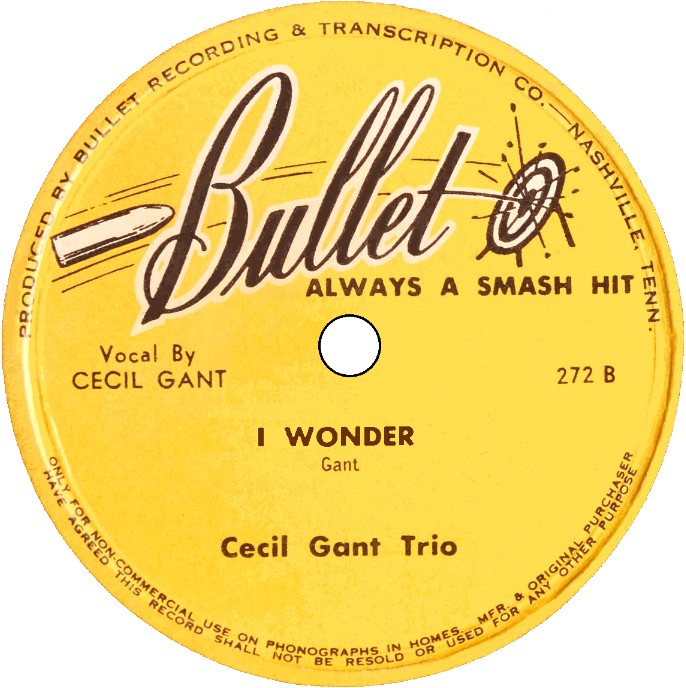
|
Above Left: Label image for Gilt-Edge 5090, released in 1944. This is the original version. Above Right: Label image for Bullet 272 B, released in 1947. This later version by the Cecil Gant Trio nicely employs a "celeste" in place of a piano. The celeste, aka "celesta", is a piano-like instrument where metallic bars are struck to produce a chimes-like sound.
LISTEN (Windows Media Player):
1. "I Wonder" - Cecil Gant - Gilt-Edge 5090 - 1944.
2. "I Wonder" - Cecil Gant Trio - Bullet 272 B - 1947.BOTH SONGS played in sequence.
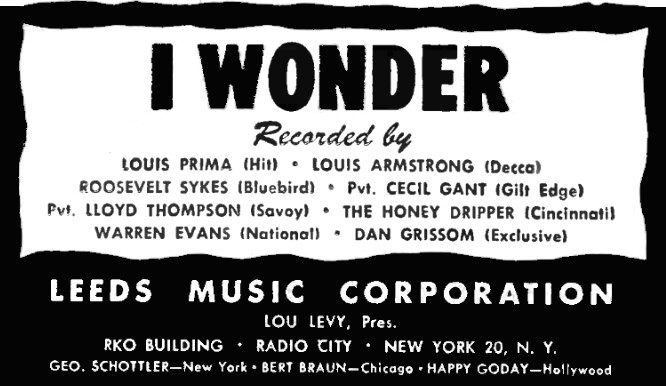
|
Above Right: THE BILLBOARD, February 3, 1945.
(NOTE: Woody Herman And His Orchestra also had a version of "I Wonder", on the Columbia label.)
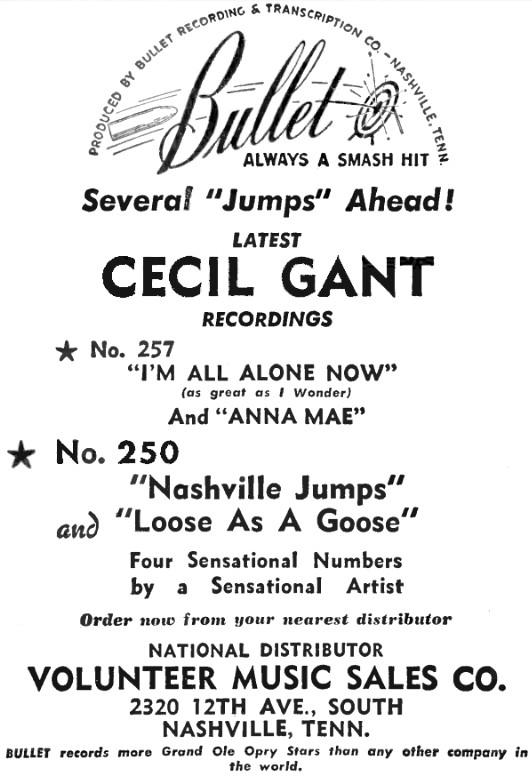
|
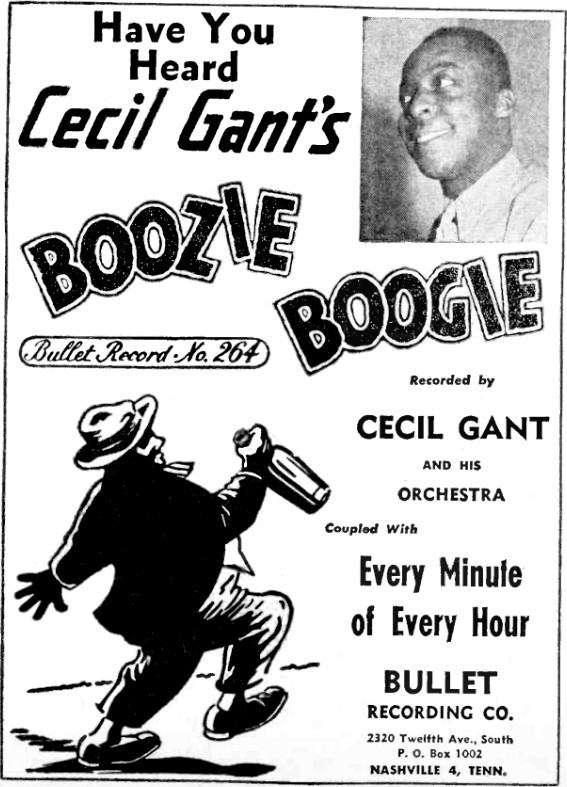
|
Above Left: THE BILLBOARD, October 5, 1946. Above Right: THE BILLBOARD, March 29, 1947.
HERE's YOUR CHANCE TO HEAR.... (Windows Media Player):
"Boozie Boogie (Instrumental)" - Cecil Gant Orchestra - Bullet 264 B - 1947.CASH BOX, July 24, 1948:
....Mr. Nathan (King Records).... disclosed that the firm had purchased additional masters. Six sides by the Ravens, one of the nation's foremost vocal groups, were purchased from Hub Records, New York. Only two of these sides had been released before. In addition, the plattery purchased sixteen sides from Cecil Gant, which Gant had recorded for himself several years ago. First side to be released is titled "Why", and in the opinion of music men, the disk promises to be another hit for the King diskery....CASH BOX, September 25, 1948:
....One thing Bill* accomplished while in Cincy.... was an understanding with Sid Nathan of King whereby that plattery would not release any of its Cecil Gant discs in respect of 4-Star's contract with the versatile artist....
(*William A. McCall Jr., owner of 4-Star Records)CASH BOX, October 9, 1948:
....Bill McCall, prexy of 4-Star Records, left for the West Coast this past week after closing a deal for pressing in the east. Bill disclosed that he had picked up all the Cecil Gant masters from King and Bullet Records. Gant is now exclusively on the 4-Star label....CASH BOX, November 20, 1948:
....Don Pierce of the 4-Star firm informs us that the "Who's Got Cecil Gant" mystery seems to be coming up with a solution and a happy ending. Four Star has all the Gant masters from King and BOP records and is reported suing Bullet in regard to the platters Gant cut for that company....NASHVILLE BANNER, February 6, 1951: CECIL GANT, 38, FAMED PIANIST, RITES SET IN OHIO
NASHVILLE—The body of Cecil Gant, Negro singer and "boogie-woogie" pianist who won national fame while still in an Army uniform, will be taken to Cleveland, Ohio, Thursday for funeral services and burial.Gant, a native of Columbia, Tenn., died unexpectedly at Hubbard Hospital Sunday night after becoming suddenly ill that afternoon at his home, 724-B Twenty-sixth Ave., North. Physicians were expected to deliver an autopsy report today on the cause of his death.
The entertainer, who made his first phonograph record, "I Wonder". while in military service during World War II and found his success assured when he returned to civilian life, was to have appeared at a New Orleans night club during the present Mardi Gras season, but his departure had been delayed by weather conditions.
Gant would have been 38 years old Feb. 25. As a child, he went with his mother to Cleveland and lived there until he entered the Army. Following his discharge after overseas service, he made extensive entertainment tours in addition to filling radio and recording engagements.
He moved to Nashville about a year ago and has been engaged largely in producing phonograph records since that time. He has appeared as a guest on "Sunday Down South" over Radio Station WSM and was first seen on tele- vision less than two weeks ago on WSM-TV's "Southern Shindig." He took part in the "Honor Roll of Mercy" for the March of Dimes over WMAK last Tuesday night.
In addition to "I Wonder", Gant's outstanding records have included "Annie May" [sic "Anna Mae"], Traintime [sic "Train Time Blues"], "Crying"[sic "Cryin' To Myself"], and "Cecil's Boogie" [sic "Cecil Boogie"]. He recently recorded "Page Mr. Jackson" with Red Foley, and the disc is scheduled for release soon. He composed most of his numbers.
He was married last May 8 to the former Alma Nelson, who survives. Other survivors include an aunt and a nephew.
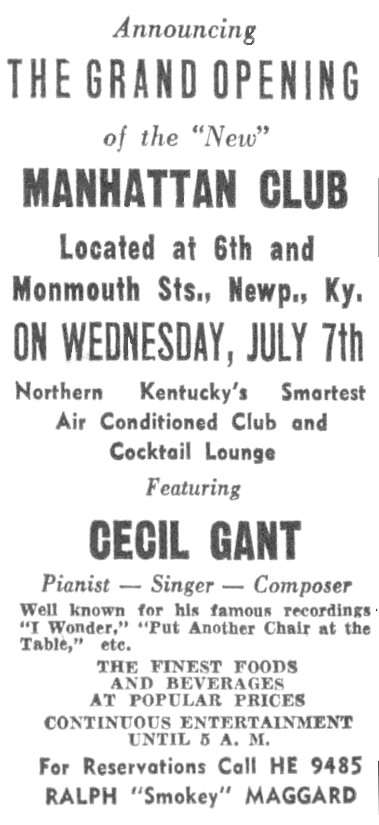
CINCINNATI POST — 7/5/48
LIL' SON JACKSON
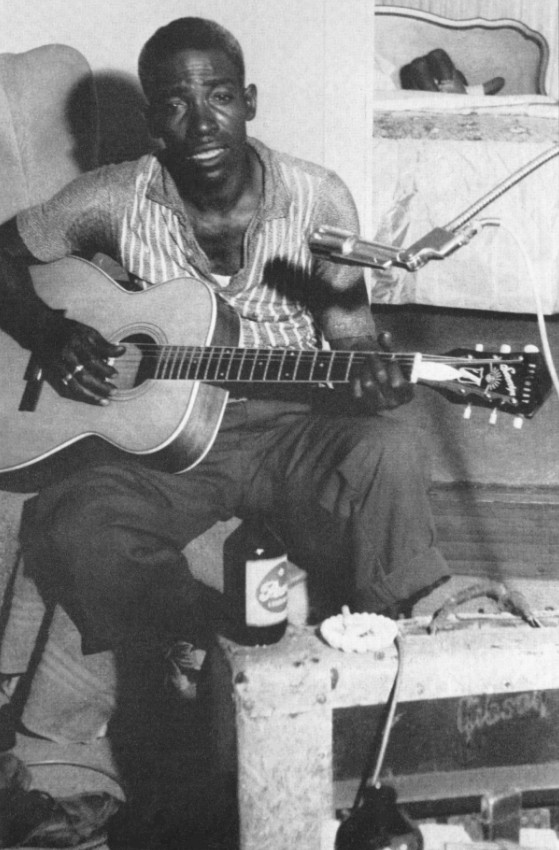
|
Above: Melvin "Little Son" Jackson, from Dallas, TX, was a singer, guitarist, and songwriter. He had twenty-four records released on Imperial Records (1950-1955). Prior to Imperial, he had records on the Gold Star, Dot, and Modern labels.
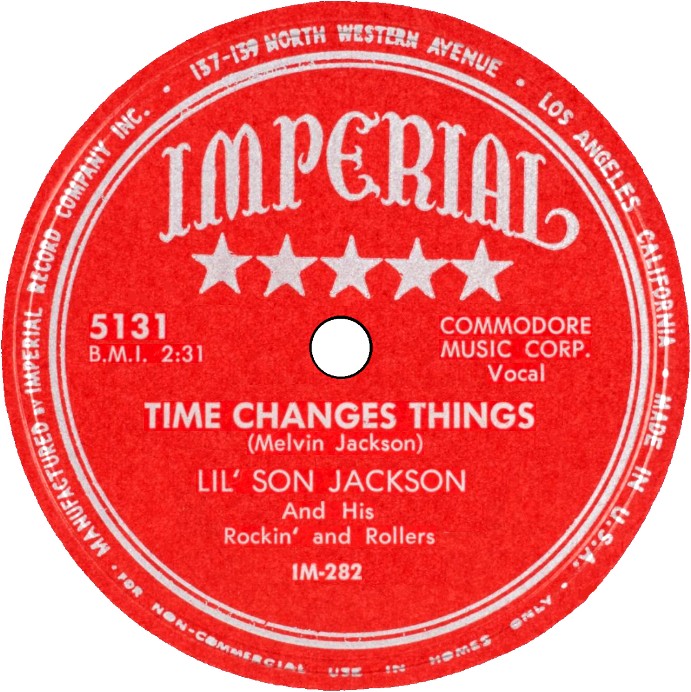
|
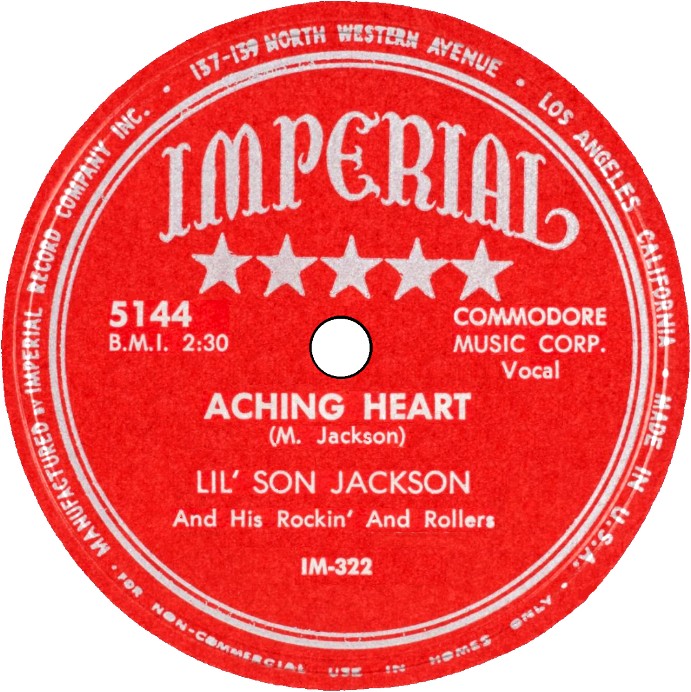
|
Above Left: Label image for Imperial 5131, released in 1951. The flip-side is "Mr. Blues". All four sides of the above two records were composed by Lil' Son Jackson (as Melvin Jackson or M. Jackson). Above Right: Label image for Imperial 5144, released in 1951. On the flip-side, "Red Light", Lil' Son is backed vocally by the band.
LISTEN (Windows Media Player):
1. "Time Changes Things" - Lil' Son Jackson - Imperial 5131 - 1951.
2. "Mr. Blues" - Lil' Son Jackson - Imperial 5131 - 1951.
3. "Aching Heart" - Lil' Son Jackson - Imperial 5144 - 1951.
4. "Red Light" - Lil' Son Jackson (Vocal Backing By Band) - Imperial 5144 - 1951.ALL FOUR SONGS played in sequence.
EXTRA RECORD — LITTLE SON JACKSON
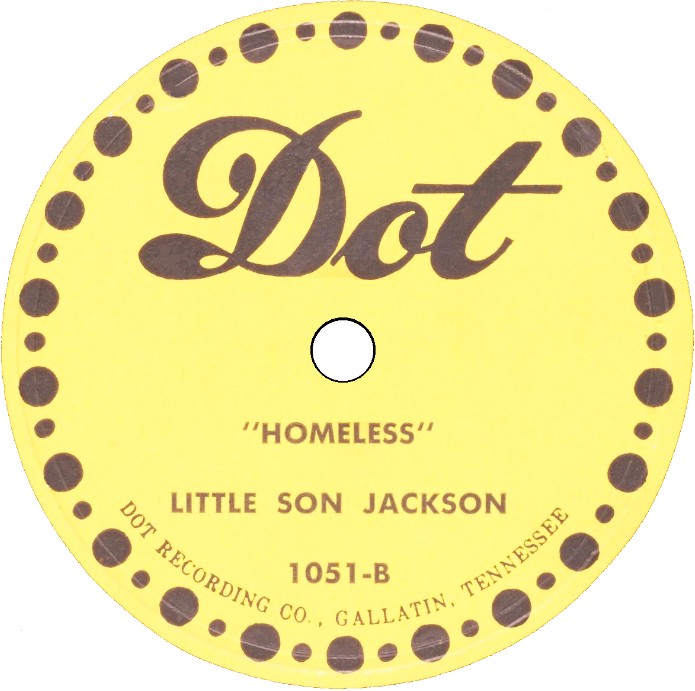
|
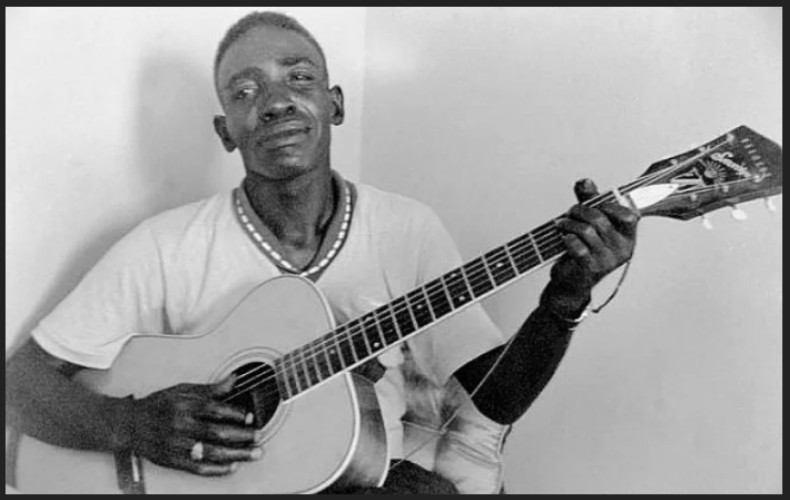
|
Above Left: Label image for Dot 1051-B, released in 1951. This song and the flip-side, "Gambling Blues", were originally done by "Little Son" Jackson as "Homeless Blues"/"Gambling Blues" on Gold Star 668 (a Houston, TX label) in 1949. The labels on both sides of this Dot record do not credit a composer or music publisher. BMI credits Melvin Jackson as composer of both sides. Above Right: Photo of Little Son Jackson.
LISTEN (Windows Media Player):
1. "Homeless" - Little Son Jackson - Dot 1051-B - 1951.
2. "Gambling Blues" - Little Son Jackson - Dot 1051-A - 1951.BOTH SONGS played in sequence.
T-BONE WALKER
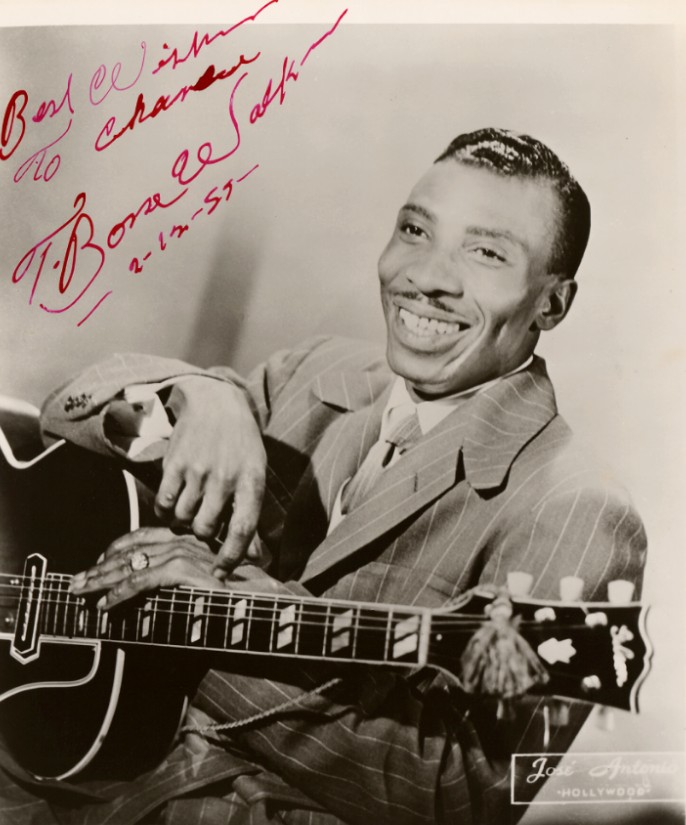
|
Above: Aaron Thibeaux "T-Bone" Walker, originally from Texas, was a singer, guitarist extraordinaire, songwriter, and orchestra leader. Many of his records were billed as by "T-Bone Walker And His Guitar" or "T-Bone Walker And His Guitar And Orchestra". He had twenty-five records on the Imperial label (1950-1956). T-Bone also had records on the Rhumboogie, Mercury, Capitol, Black & White, Blue Note, Comet, Old Swing-Master, and Atlantic labels.
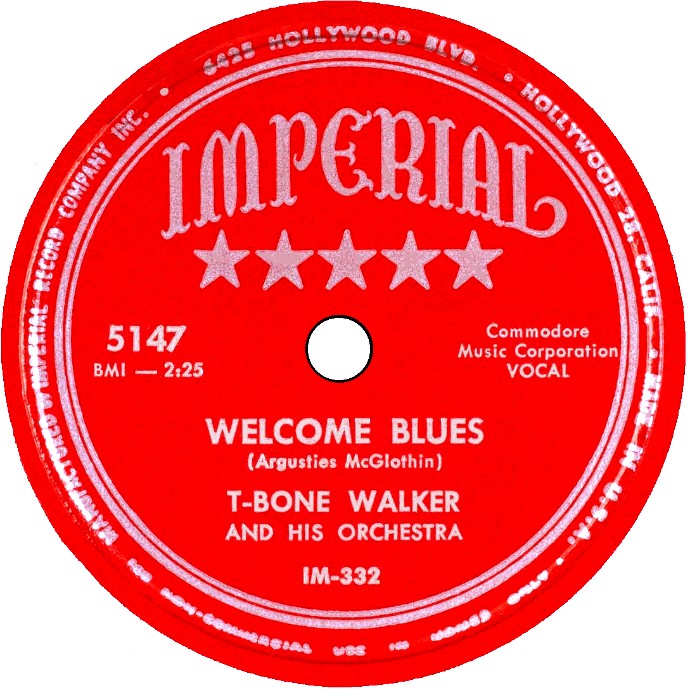
|
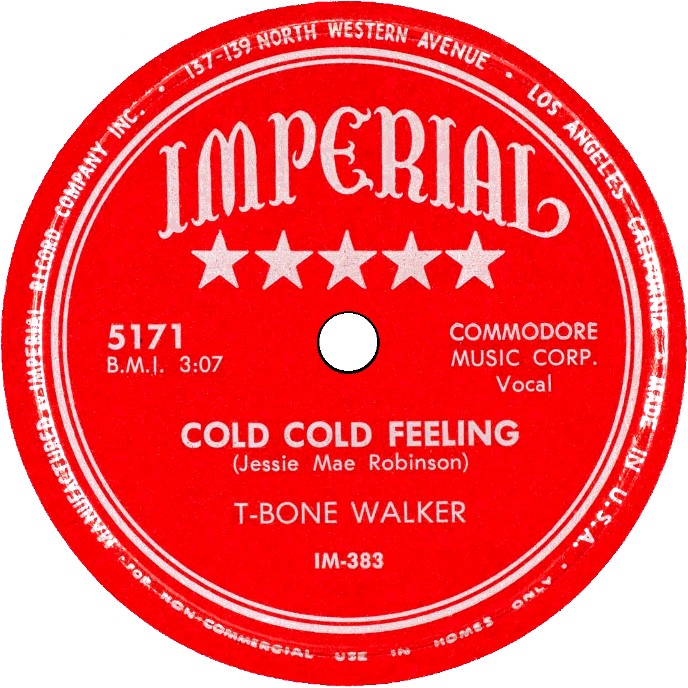
|
Above Left: Label image for Imperial 5147, released in 1951. Above Right: Label image for Imperial 5171, released in 1952. This label shows Imperial's Los Angeles address, but their offices had moved from Los Angeles to Hollywood a year or two earlier.
"Cold Cold Feeling" was composed by Jessie Mae Robinson. See more about her further below.
LISTEN (Windows Media Player):
1. "Welcome Blues" - T-Bone Walker - Imperial 5147 - 1951.
2. "Cold Cold Feeling" - T-Bone Walker - Imperial 5171 - 1952.BOTH SONGS played in sequence.
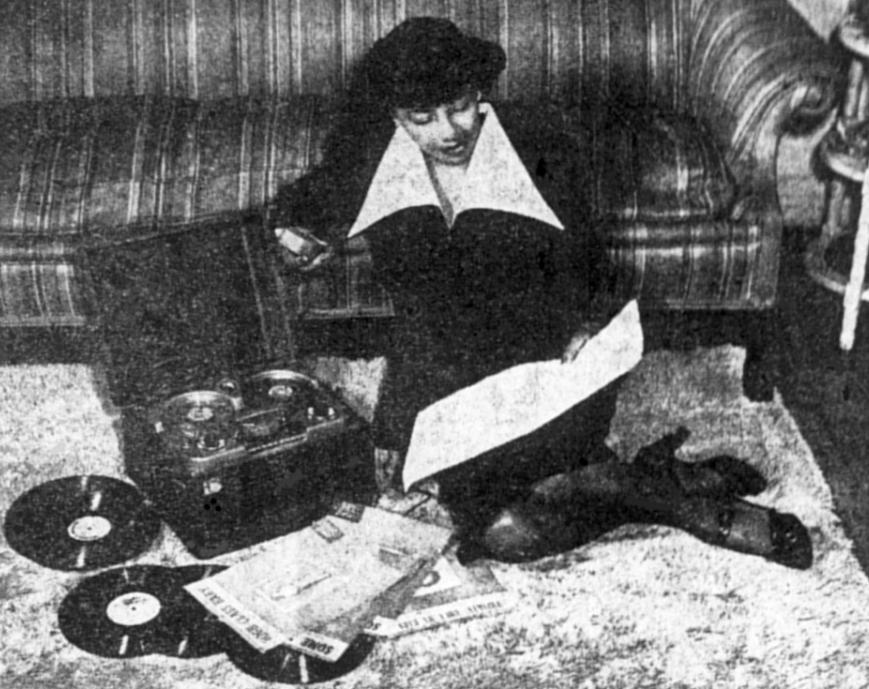
|
Above: CALIFORNIA EAGLE, October 23, 1952:
LOCAL WOMAN IS AUTHOR OF "I WENT TO YOUR WEDDING"
NOTE: Jessie Mae Robinson is the composer of "Cold Cold Feeling" (T-Bone Walker on Imperial), as well as "I Went To Your Wedding" (Damita Jo With Steve Gibson's Red Caps), "Once There Lived A Fool" (Savannah Churchill And Striders), "Roomin' House Boogie" (Amos Milburn), "Black Night" (Charles Brown), "Keep It A Secret" (Five Crowns), and "Blue Light Boogie" (Louis Jordan), among others.
Jessie Mae Robinson, 5112 McKinley Street, is the author of the current nation's number one hit tune "I Went To Your Wedding". Her song today has sold well over 7,000,000 copies since its release.... Modest Jessie Mae has been writing music for seven years. "Blue Light Boogie" was a special tune she wrote for Louis Jordan and "Once There Was A Fool" was done by her for songster Jimmy Grissom.
About the hit tune "I Went To Your Wedding", Jessie Mae attended the wedding of her niece and was inspired to write the song after witnessing so many tears at the wedding. Song stylists Patti Page and Damita Jo made recordings and it soon skyrocketed to the nation's current hit.
Jessie Mae is a native of Los Angeles and makes her home with her 16-year-old daughter, June, who attends L.A. High School. She is a staff writer for Superior Bernstine Music Publisher with offices in Hollywood and New York.
She will soon release another tune titled "Keep It A Secret", on the RCA Victor label with Jo Stafford and Columbia's Dinah Shore....

|
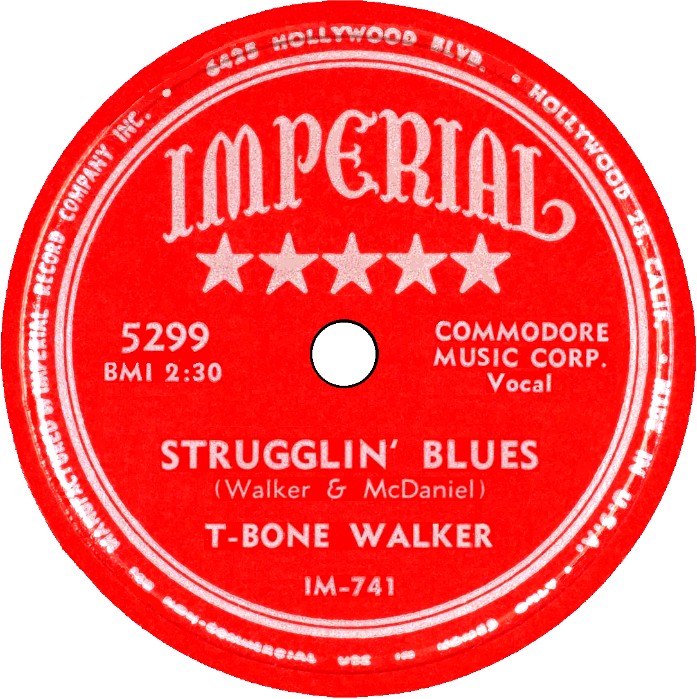
|
Above Left: Photo of T-Bone Walker. Above Right: Label image for Imperial 5299, released in 1954. BMI identifies composer "McDaniel" as "Clarence Grady Mc Daniel".
LISTEN (Windows Media Player):
"Strugglin' Blues" - T-Bone Walker - Imperial 5299 - 1954.
EXTRA RECORDS — T-BONE WALKER
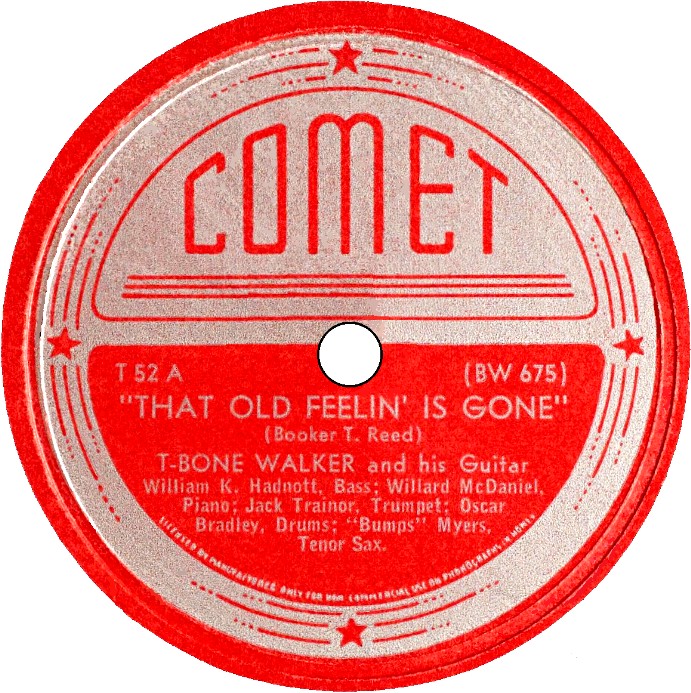
|
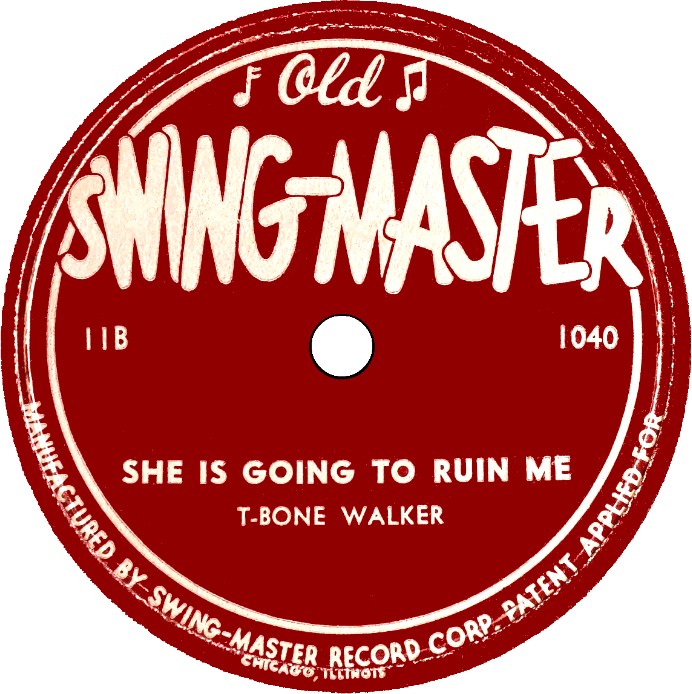
|
Above Left: Label image for Comet T52A, released in 1949. Above Right: Label image for Old Swing-Master 11B, released in 1949.
The Billboard Review (2/5/49):
T-BONE WALKER — Comet T 52
Description Blues (69) The slick guitar and piano effects are overdone in this otherwise honest blues.
That Old Feelin' Is Gone (64) Routine blues is propelled with a light, bouncy boogie beat. T-Bone's guitar provides more flavor than his tonsils, but there's more of the latter.
(NOTE: Ratings had a range of 0-100 with 60-69 considered as "satisfactory".)LISTEN (Windows Media Player):
1. "That Old Feelin' Is Gone" - T-Bone Walker And His Guitar - Comet T52A - 1949.
2. "Description Blues" - T-Bone Walker And His Guitar - Comet T52B - 1949.
3. "She Is Going To Ruin Me (Vocal Backing By Band)" - T-Bone Walker - Old Swing-Master 11B - 1949.ALL THREE SONGS played in sequence.
MORE T-BONE WALKER
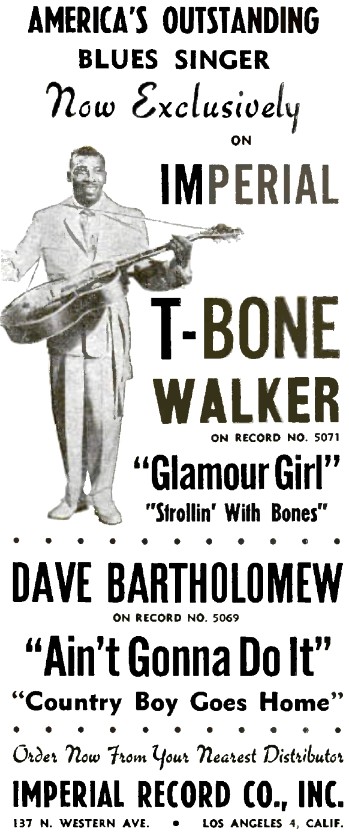
|
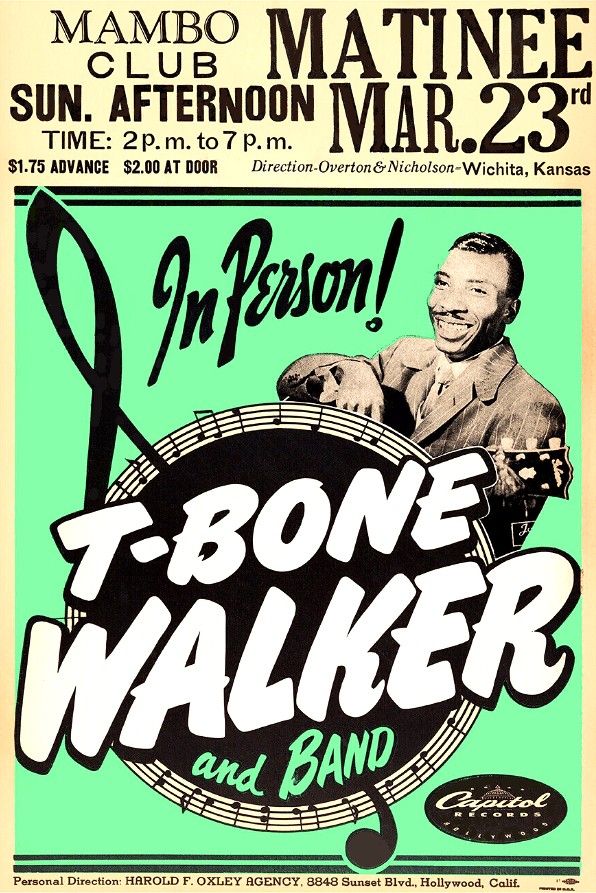
|
Above Left: THE BILLBOARD, April 22, 1950.
(NOTE: Imperial 5071 was T-Bone's first record on the Imperial label. Dave Bartholomew will be included in Part Three of this article.)Above Right: T-Bone Walker poster from March 1952.
THE BILLBOARD, April 9, 1949: T-BONE DISKS DRAW B&W EYE
HOLLYWOOD—A listing in the April 2 issue of The Billboard Advance Record Releases, by Swing-Master Records, announcing the forthcoming release of two sides by T-Bone Walker, started a probe by Black & White Records as to how that label obtained masters of the Walker cuttings. Black & White claims to have Walker under an exclusive recording contract.Harold Oxley, Walker's agent, said he too was in the dark on Swing-Master acquiring masters of Walker recordings. Mac Green, B&W manager, sent the following to Swing-Master Records and Master Recording Company, jointly owned diskeries in Chicago:
"In the current issue of The Billboard we notice you are releasing Don't Give Me the Run Around and My Baby Left Me, your Swing-Master No. 11, recorded by T-Bone Walker. Please be advised that T-Bone Walker is under an exclusive recording contract with the Black & White Recording Company and has been for years.
I should like to learn how you obtained the masters of the above mentioned songs. An immediate reply would be greatly appreciated."
(NOTE: The A-side of Old Swing-Master No. 11 is "My Baby Left Me", but the B-side actually released is "She Is Going To Ruin Me".... see the label and hear the audio a little further up this page.)
THE BILLBOARD, April 30, 1949: WALKER TO CAP; CLOSE B&W DEAL FOR T-BONE WAX
HOLLYWOOD—Capitol Records this week signed T-Bone Walker to a recording contract and closed a deal with Black & White to purchase all released and unreleased Walker masters. Walker has recorded for B&W for the past three years and his pact with the indie still had four years to run. His paper with Capitol is for five years with options.Capitol gets 48 masters which include everything the blues artist had recorded for Black & White. Walker had been B&W's top selling race artist....
CASH BOX, June 11, 1949: T-BONE WALKER SET TO RETURN TO CAPITOL RECORD FOLD
HOLLYWOOD, CALIF.—T-Bone Walker's first disks under his new and exclusive contract with Capitol Records are set to be released nationally on June 13th, it was learned this past week. Formerly featured on Comet and Black & White Records, the tall guitar player will hit the market with four songs, "Vacation Blues" and "Prison Blues" will hit the market for the first time; "Call It Stormy Monday But Tuesday's Just As Bad" and "Your Wig Is Gone" will appear as re-issues.All four of T-Bone's releases will appear on Capitol's royal purple label. Walker, who first attracted attention as a member of the old Les Hite ork, today ranks as one of the greatest attractions in the blues and jazz fields.
THE BILLBOARD, April 15, 1950: T-BONE LEAVES CAP, INKS WITH IMPERIAL
HOLLYWOOD—Blues shouter T-Bone Walker has ankled from the Capitol Records fold to the Imperial label. Indie will release its first Walker platter next week, coupling "Glamor Girl" with "Strollin' With Bones".Departure from Cap is reportedly amicable. Walker joined the Coast major last year when Capitol bought approximately 30 masters from the defunct Black & White label. Capitol relied on this pool for its releases and intends to continue issuing Walker sides with approximately 20 masters still on the shelf.
Capitol's inking of Walker was unique in that label had always preferred building its own rhythm and blues talent. Walker was the first r. and b. name to join diskery.
Walker's departure from Cap and subsequent signing with Imperial was arranged by his agent, Harold Oxley. Imperial Prexy Lou Chudd feels that the acquisition of Walker will substantially fortify the label's position in the r. and b. field.
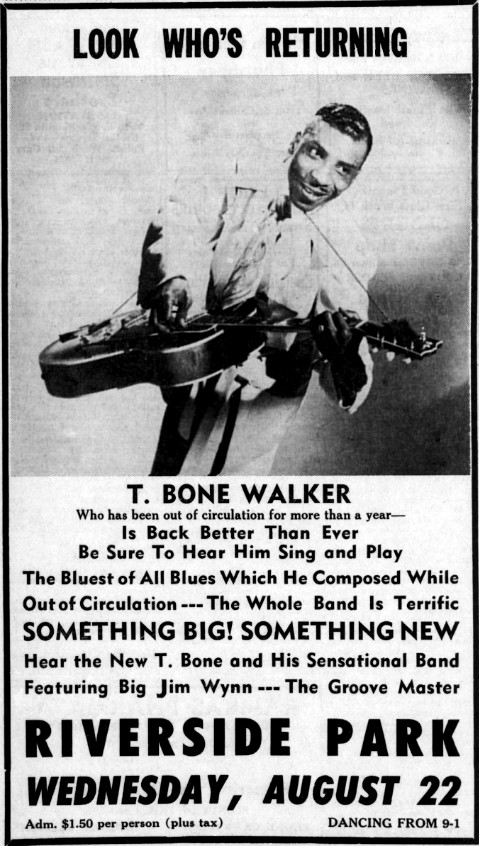
ARIZONA SUN — 8/10/51
CASH BOX, March 25, 1950: IMPERIAL PACTS T-BONE WALKER
NEW YORK—Lou Chudd, President of Imperial Records, announced that he has signed recording artist T-Bone Walker. The Coast diskery chief has been on a flying visit of the entire country, stopping at New Orleans, La., before visiting the Big City. He is expected to return to Los Angeles on the 16th.The acquisition of guitarist Walker is a real feather in the cap of the fast-moving Chudd as the artist has been responsible for many hit numbers.
SMILEY LEWIS
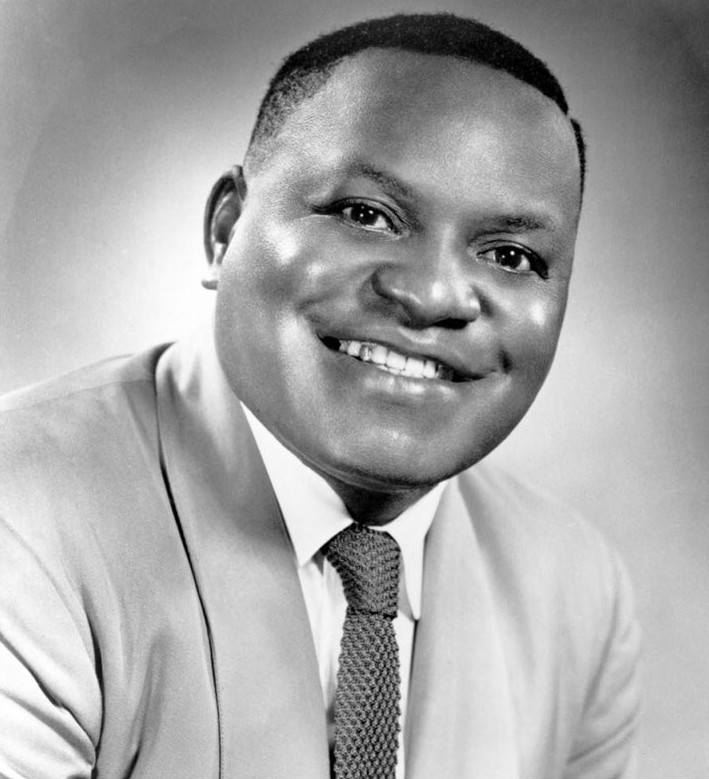
|
Above: Smiley Lewis, from New Orleans, was a singer, guitarist, songwriter, and orchestra leader. His songs were generally in the New Orleans mode of Fats Domino. Smiley was a consistent moneymaker for Imperial for many years. He had twenty-seven records on the label from 1950 to 1958, ten of those in the years 1950-1953.
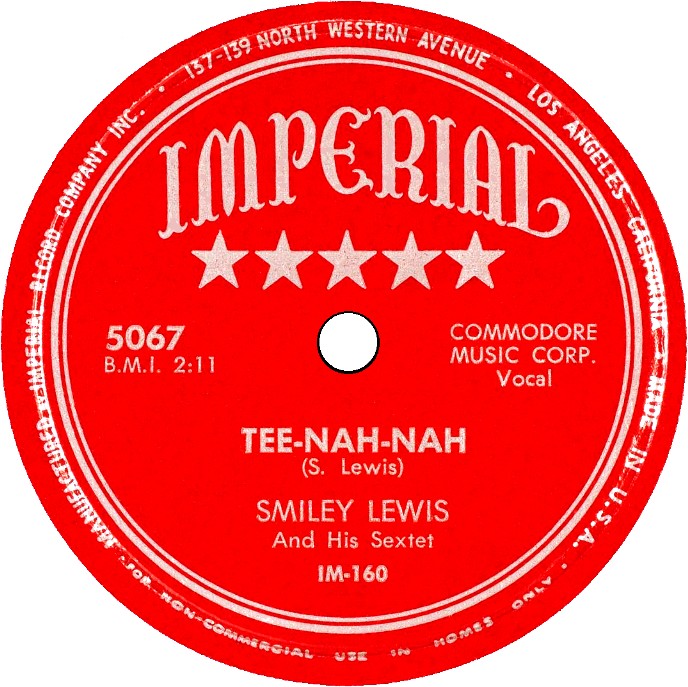
|
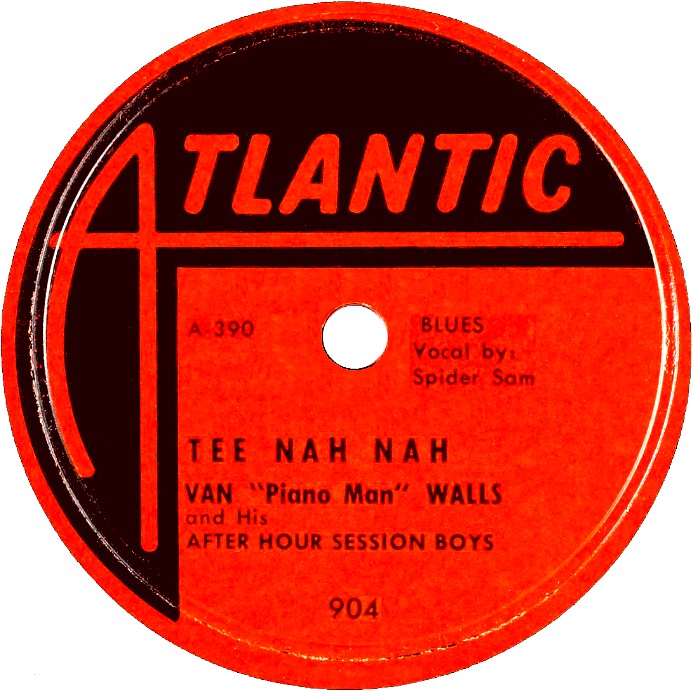
|
Above Left: Label image for Imperial 5067, released in March 1950. This is Smiley Lewis' first record for Imperial. Above Right: Label image for Atlantic 904, released in 1950 shortly after the original Imperial version. The label, it seems intentionally, does not credit either the composer or the publishing company. Somewhat surprising for the seemingly ethical Atlantic label, but they were still struggling to establish themselves at the time.
LISTEN (Windows Media Player):
1. "Tee-Nah-Nah" - Smiley Lewis And His Sextet - Imperial 5067 - 1950.
2. "Tee Nah Nah" - Van "Piano Man" Walls And His After Hour Session Boys - Atlantic 904 - 1950.BOTH SONGS played in sequence.
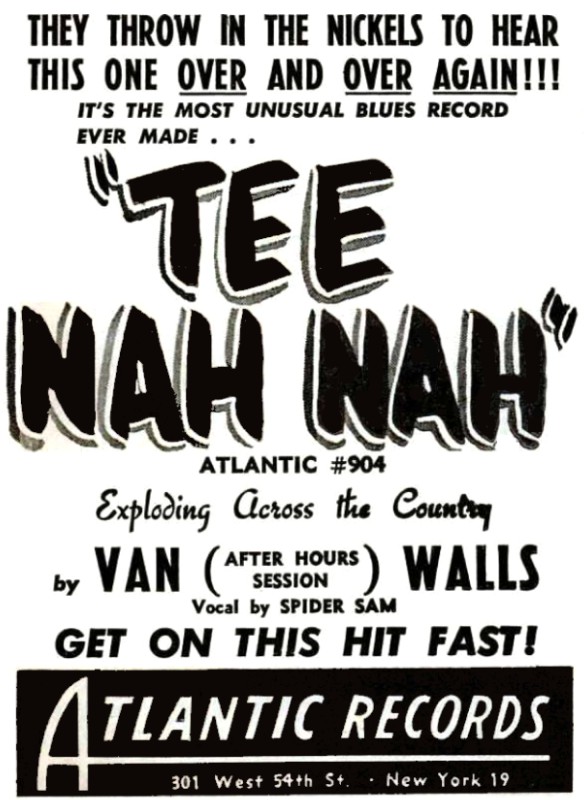
|
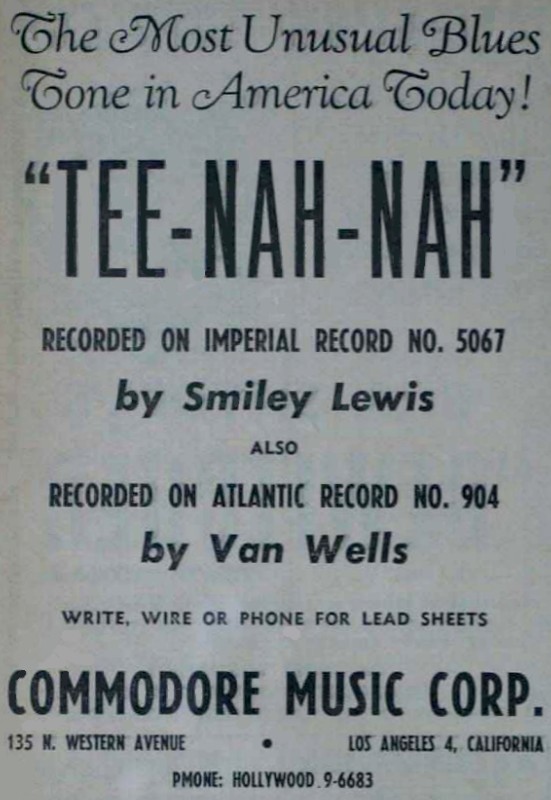
|
Above Left: THE BILLBOARD, March 18, 1950. Above Right: THE BILLBOARD, April 8, 1950.
(NOTE: "Commodore Music Corp.", of course, is Imperial Records' publishing company.)Cash Box Review (3/25/50):
VAN WELLS — Atlantic 904
[sic "Van Walls", it's the same error as the above right clipping.]
Tee Nah Nah
Ditty that is rapidly catching on in many spots throughout the nation is this item tagged "Tee Nah Nah". It's a zany piece of music, that is just weird enough to blossom out into a big hit. This rendition, by Van "Piano Man" Walls and his After Hour Session Boys shows well enough, and should grab some healthy coin play. Vocal by Spider Sam on the side echoes the title in effective manner.
Above Left: Vann Walls and His Famous Rhythm Notes in 1949 at the Club Trocaveria.
(L-R) Vann Walls - piano, Phelton Simmons - bass, James Morgan - trumpet, Lee Booker - tenor saxophone, Bill Graham - drums.Phelton Simmons: "At the Trocaveria, shows went six nights a week in the late 1940's. We played nice smooth music with a Duke or Count feel. Vann Walls was a happy supportive person who arranged most of the music, because the out-ot-town floor show groups rarely brought written music with them."
Above Right: (From 1953)
CURRENT AT RHUMBOOGIE, 626 St. Clair Ave., Columbus, is Van Walls trio, one of better musical aggregations in Ohio's capital city. Management of club says that signing of trio represents another step in program to bring pleasing entertainment to Rhumboogie patrons.
Pictured from left are Reginald Morgan, saxophone; Phelton Simmons, bass; Vann Walls, piano.
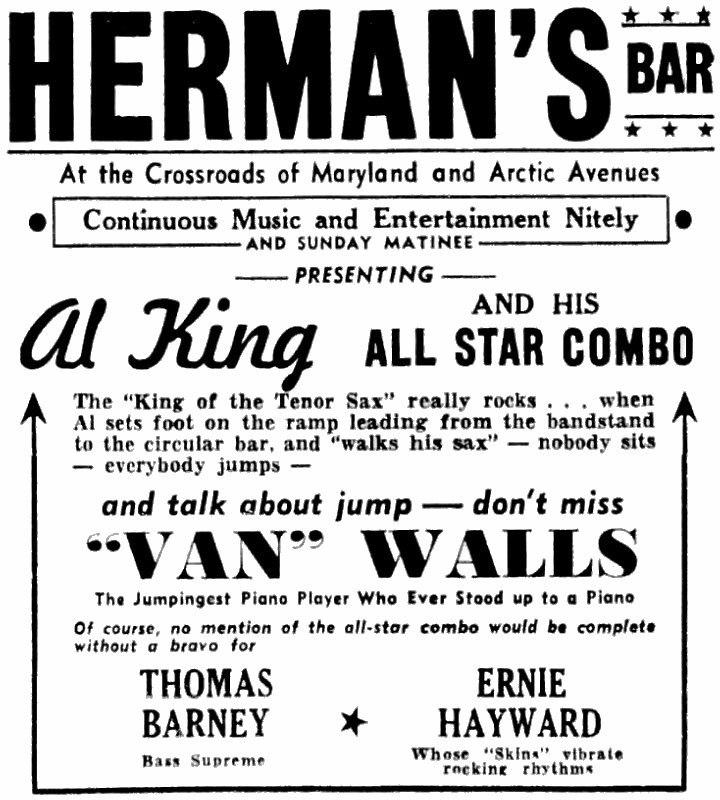
|
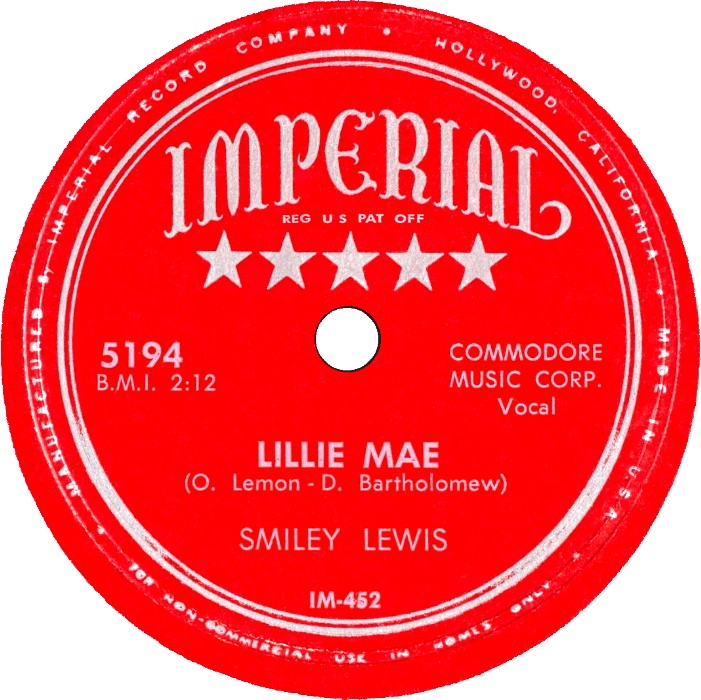
|
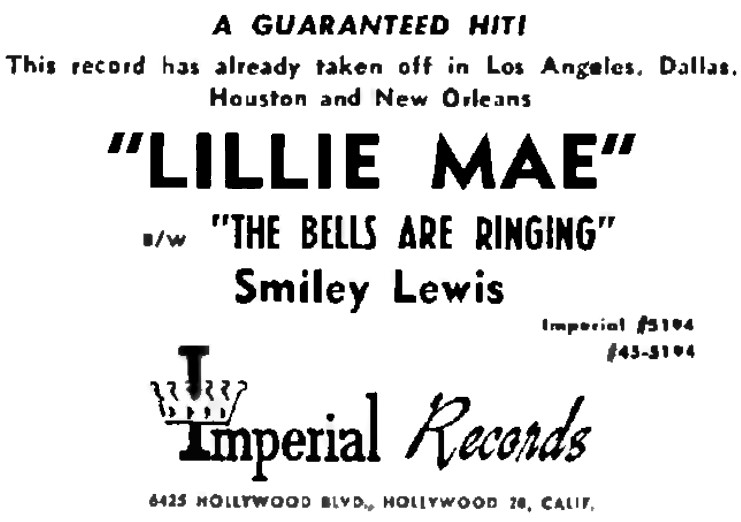
|
Above Left: Label image for Imperial 5194, released in 1952. The band provides vocal backing for Smiley on this one. The flip-side, "The Bells Are Ringing", is the better side and was a hit for him. Song composer Overton Lemon (or possibly Lemons) is Smiley Lewis' real name. The song title, "Lillie Mae", came from Smiley's mother's name.
Above Right: THE BILLBOARD, June 8, 1952.
LISTEN (Windows Media Player):
1. "Lillie Mae" - Smiley Lewis (Vocal Backing By Band) - Imperial 5194 - 1952.
2. "The Bells Are Ringing" - Smiley Lewis - Imperial 5194 - 1952.BOTH SONGS played in sequence.
NOTE: THERE WILL BE MORE SMILEY LEWIS IN THE NEXT PART OF THIS ARTICLE.
MISCELLANEOUS IMPERIAL RECORDS ARTISTS
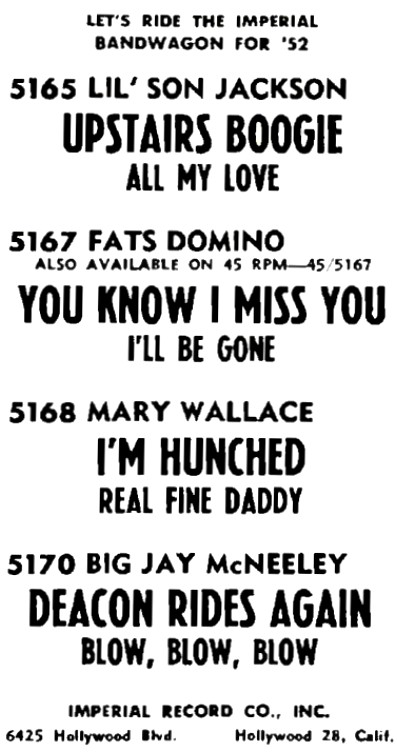
|
Above: THE BILLBOARD, January 5, 1952.
NOTE: It appears that only Fats Domino (and perhaps some other top sellers) were being issued on the 45-rpm speed at the time.
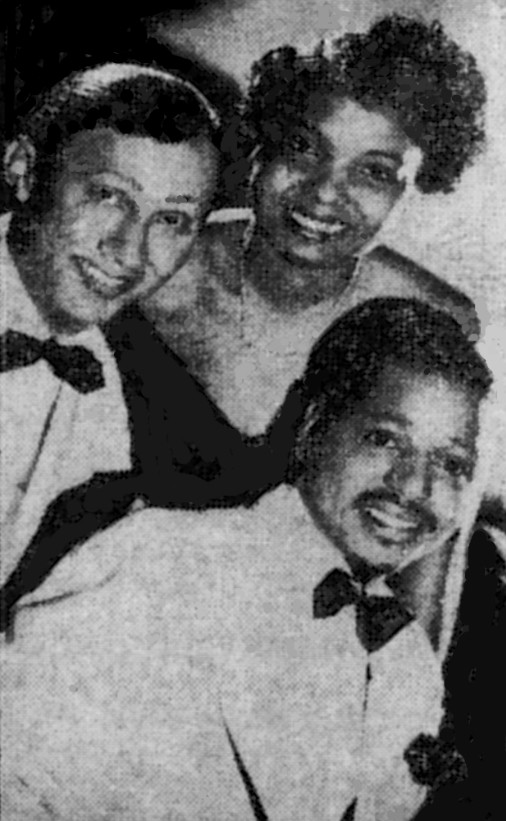
|
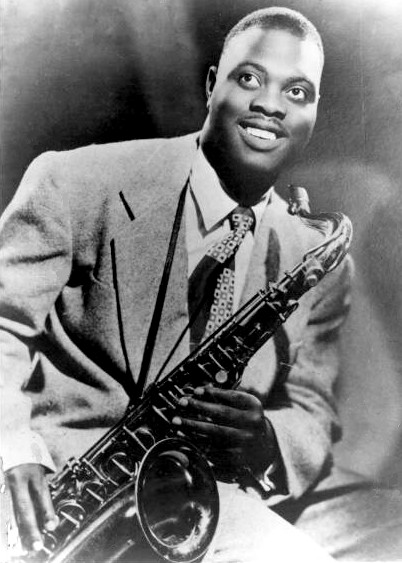
|
Above Left: ARIZONA SUN, July 27, 1951.
(NOTE: Mary Wallace is in this picture with trumpeter and orchestra leader Monte Easter (left) and Jimmy Delaney, a saxophonist/vocalist in Easter's orchestra at the time. Monte Easter And His Orchestra, under that name, had four records released on the Imperial label, all in 1951.The Easter orchestra also recorded for the Discovery label in late 1952, including one release featuring Jessie Mae Robinson as vocalist. This is a different Jessie Mae than the songwriter shown further up on this page.)
Cash Box Review (10/25/52):
JESSIE MAE ROBINSON — Discovery 1203
Jessie Mae's Blues (C+) Jessie Mae Robinson sings a moderate tempo rhythmic blues with zest. Monte Easter's instrumental aggregation assists the chantress with a stirring backdrop.
(NOTE: A rating of C+ was considered as "good".)LISTEN (Windows Media Player):
"Jessie Mae's Blues " - Jessie Mae Robinson With Monte Easter Orchestra - Discovery 1203 - 1952.MISSISSIPPI ENTERPRISE (Jackson, MS), September 29, 1951:
MUSIC BY MONTE EASTER
....The "Back To School" dance will be at Seven's Rose Room on Tuesday, October 2. This four star attraction [or is it "five"?] includes Linda Hopkins, the New Orleans born singer, who was discovered by Johnny Otis last December........Monte Easter recorded for Imperial Records, as have Jimmy Delaney and Mary Wallace. Right now they have out on Imperial Records "I Was Mad", "What Is The Use", "Without Your Love",
and "There's Always Another Day".... (These last two feature Jimmy Delaney as vocalist.)Dan Grissom is the other part of this big attraction....
THE BILLBOARD, January 20, 1951:
Balladier Dan Grissom and Eddie Johnson, blues warbler, were signed to term disking contracts last week by Lou Chudd, of Imperial Records. Diskery will record the artists within the next 10 days. Grissom was formerly with the Jimmy Lunceford outfit. Deal was worked thru the Harold Oxley Agency....
(NOTE: Dan Grissom had just one record on Imperial, that in 1951.)Above Right (At Top): Photo of Big Jay McNeeley, who was a saxophonist, composer, and orchestra leader. His eight records on Imperial (1951-1953) include some with Jesse Belvin and the Three Dots And A Dash (those are covered in Specialty Records - Part Five.
Big Jay recorded for the Savoy, Exclusive, and Aladdin labels before joining Imperial Records.
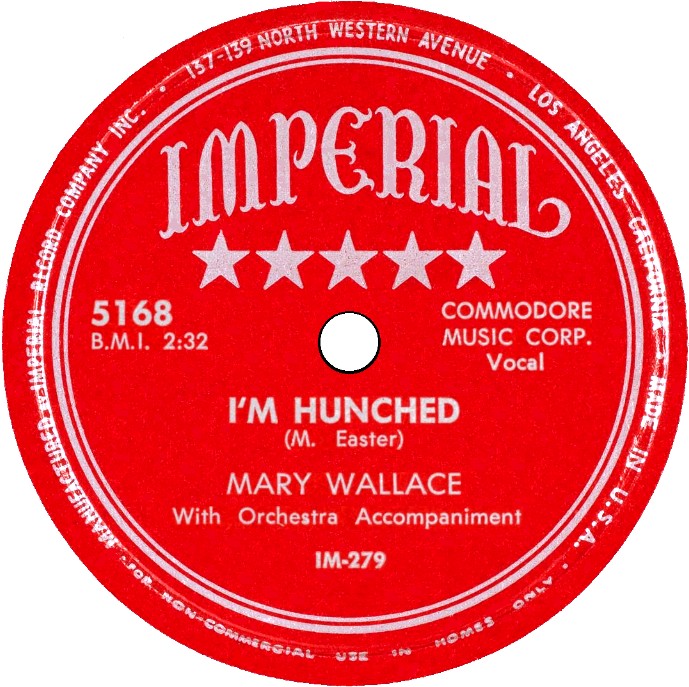
|
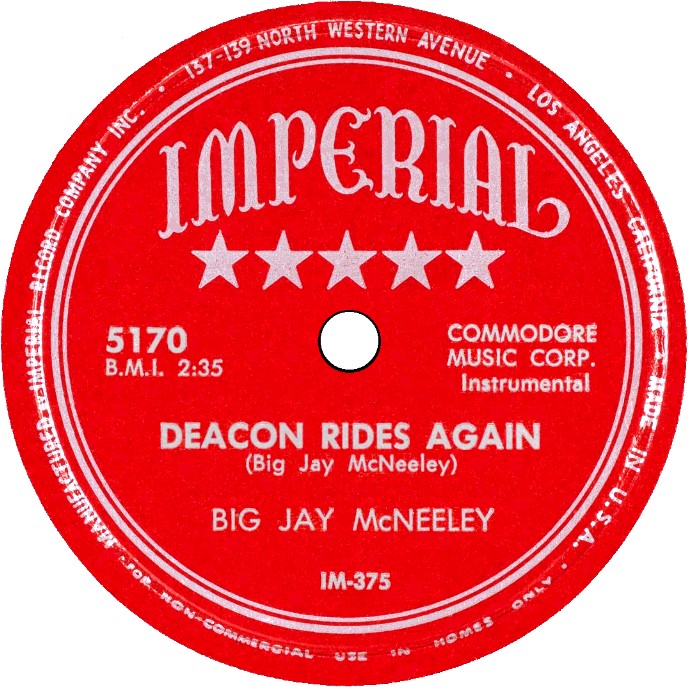
|
Above Left: Label image for Imperial 5168, released in January 1952. It is a re-issue of Imperial 5128, which was recorded in April 1951. The flip-side is "Real Fine Daddy". Both sides were composed by Monte Easter. It is his orchestra that is backing Mary Wallace on this record. "I'm hunched" is an expression that means "I'm hip to that jive."
Above Right: Label image for Imperial 5170, released in 1952. The flip-side is "Blow, Blow, Blow". Both sides were composed by Big Jay.
LISTEN (Windows Media Player):
1. "I'm Hunched" - Mary Wallace - Imperial 5168 - 1952.
2. "Real Fine Daddy" - Mary Wallace - Imperial 5168 - 1952.
3. "Deacon Rides Again (Instrumental)" - Big Jay McNeeley - Imperial 5170 - 1952.
4. "Blow, Blow, Blow (Instrumental)" - Big Jay McNeeley - Imperial 5170 - 1952.ALL FOUR SONGS played in sequence.
VALLEY TIMES (JACKSON, MS), November 12, 1952: 'BIG JAY' SELECTED BY JOHNNIE RAY FOR NOV. 23 BOW
"Big Jay" McNeeley, a Los Angeles boy who zoomed to musical heights in the past few months, has been selected by Johnnie Ray to appear on his program at the Shrine Auditorium Nov. 23.McNeeley, a tenor saxophonist, features a jazz style termed "modern Dixieland". His latest record hit is a novelty called "The Goof". Appearing also on the first Johnnie Ray popular concert program will be Harry James and his Music Makers and the Four Lads, sparkling young vocal group from Toronto....
(NOTE: "The Goof" was released on Federal Records 12102 in 1952, but the record was never mentioned in The Billboard or Cash Box. In contrast, Big Jay's "Blow, Blow, Blow", on Imperial, shows up many times.)
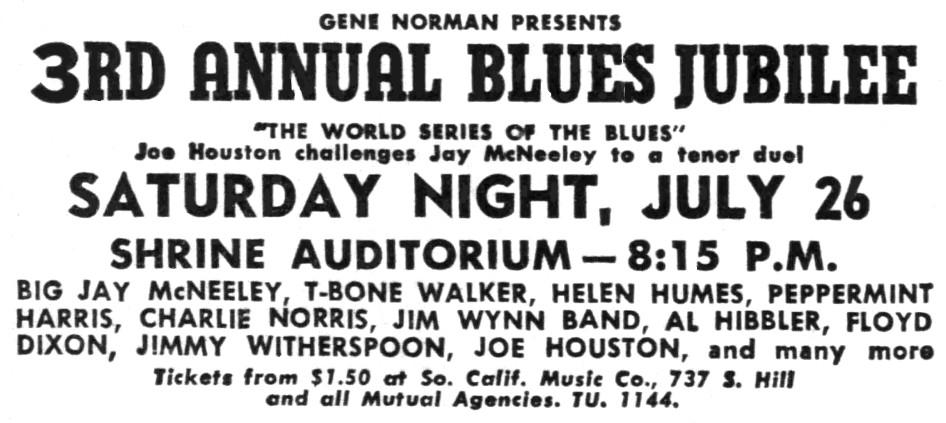
|
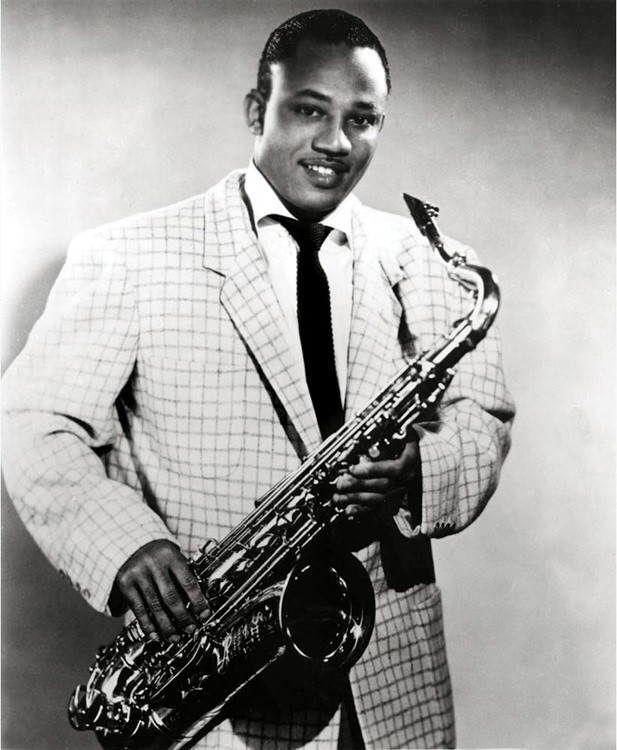
|
Above: Joe Houston, from Texas, was a singer, saxophone player, and orchestra leader. He was known as the "Wild Man of the Tenor Sax". Joe moved to Los Angeles in the early 1950s. He had four records on the Imperial label, all released in 1952. Joe also had records on the Freedom, Mercury, Modern, RPM, and Cash labels. OAKLAND TRIBUNE, September 4, 1955: JOE HOUSTON AND HIS SAX COME TO OAKLAND
Joe Houston, the tenor sax player whose orchestra will accompany the rhythm and blues group, The Drifters, in a dance tomorrow night at Sweet's Ballroom, studied classical music for three years at Wilberforce University and Julliard in New York before launching his career as a bandleader.Houston, who won a scholarship to Wilberforce when he was only 17, had originally intended to be a clarinetist but displayed such aptitude for the tenor saxophone that he decided to devote his time to it.
With his orchestra he has recorded many hit tunes in recent years including "Blow Joe Blow", "Way Out", and "All Night Long".
CALIFORNIA EAGLE, September 15, 1955: JOE "SAX" HOUSTON
....Joe Houston is the "wild man of the tenor sax". His antics with his horn are recognized all over the Coast. He can probably blow a sax in more positions than any other man alive. Aside from his showmanship, however, Joe is a fine musician. Ask any of the boys in the know....
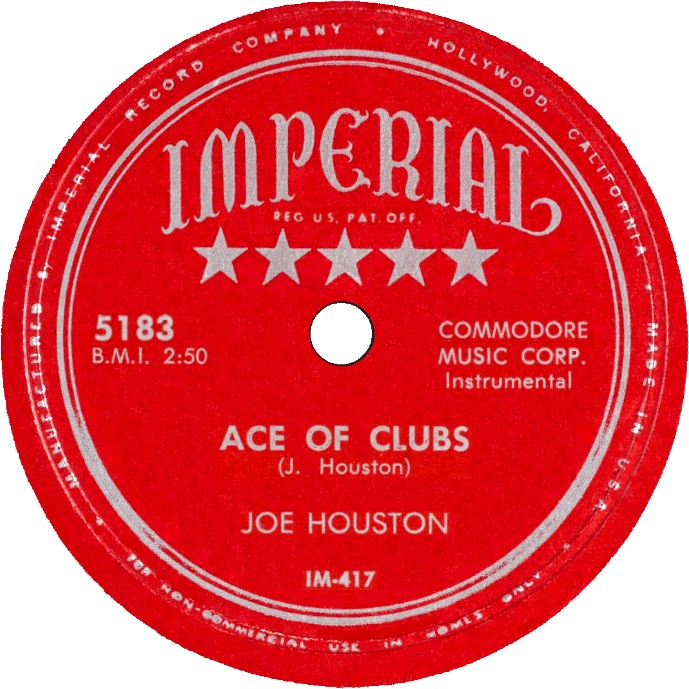
|
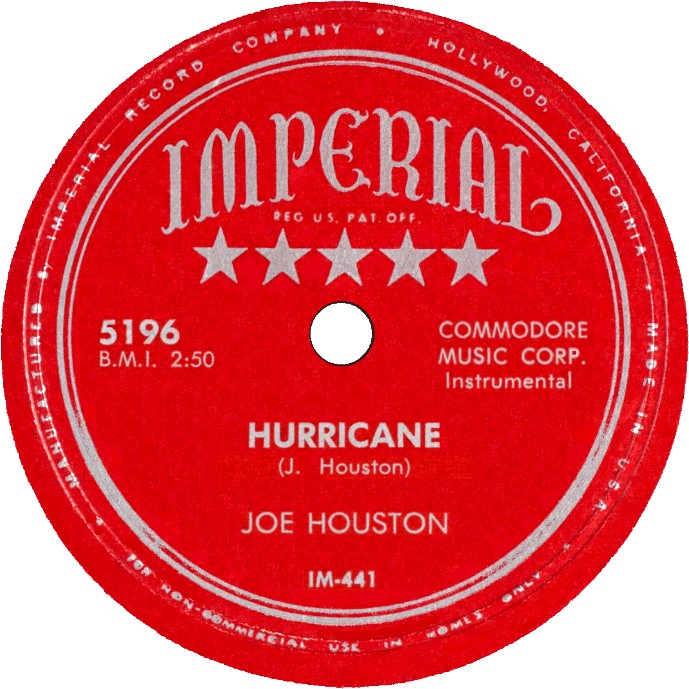
|
Above Left: Label image for Imperial 5183, released in 1952. The flip-side, "Jump The Blues", is a vocal, but the label does not identify the singer. Above Right: Label image for Imperial 5196, released in 1952. All four sides of the above two records were composed by Joe Houston.
Cash Box Review (5/10/52):
JOE HOUSTON — Imperial 5183
Ace Of Clubs/Jump The Blues
A driving jump, written by Joe Houston, is given a spirited instrumental treatment by Joe and his group of musicians. While the exciting arrangement showcases the sax, the brass section is unobtrusive, and the result is an etching that's easy on the ears. The second end is a somewhat slower blues, which the vocalist socks out in top flight fashion.Cash Box Review (7/12/52):
JOE HOUSTON — Imperial 5196
Bobby Sox Ramble (B) A fast tempo instrumental is treated to the expert orking of Joe Houston and his group. Solid horn blowing stands out on the waxing.
Hurricane (C+) The instrumental aggregation drive out a wild beat jump tune. As on the upper deck, the horn blowing is featured.
(NOTE: A rating of B was considered as "very good" and C+ as "good".)LISTEN (Windows Media Player):
1. "Ace Of Clubs (Instrumental)" - Joe Houston - Imperial 5183 - 1952.
2. "Jump The Blues" - Joe Houston - Imperial 5183 - 1952.
3. "Hurricane (Instrumental)" - Joe Houston - Imperial 5196 - 1952.
3. "Bobby Sox Ramble (Instrumental)" - Joe Houston - Imperial 5196 - 1952.ALL FOUR SONGS played in sequence.
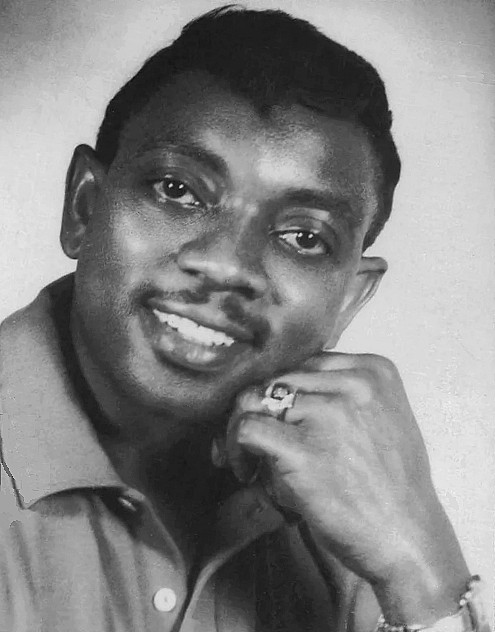
|
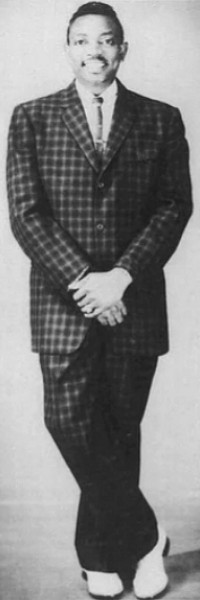
|
Above: Two photos of Tommy Ridgley, who was from New Orleans. He was a singer, pianist, songwriter, and orchestra leader. His first record was released on the Imperial label in December 1949. He continued recording for Imperial resulting in a total of five records before moving to the Atlantic label circa late 1953/early 1954. In 1954, Tommy had some minor hits for Atlantic, "Ooh Lawdy My Baby" and the instrumental "Jam Up" (well, Alan Freed did give "Jam Up" heavy play).
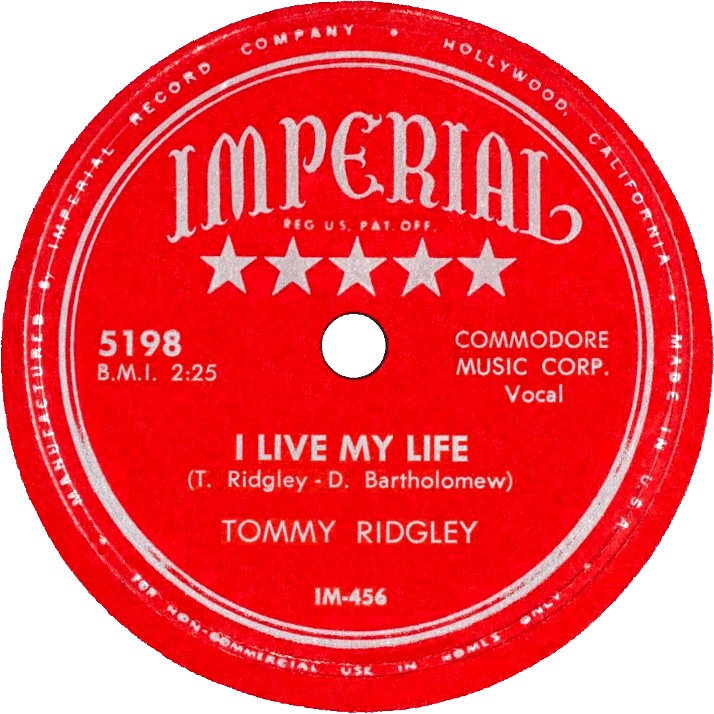
|
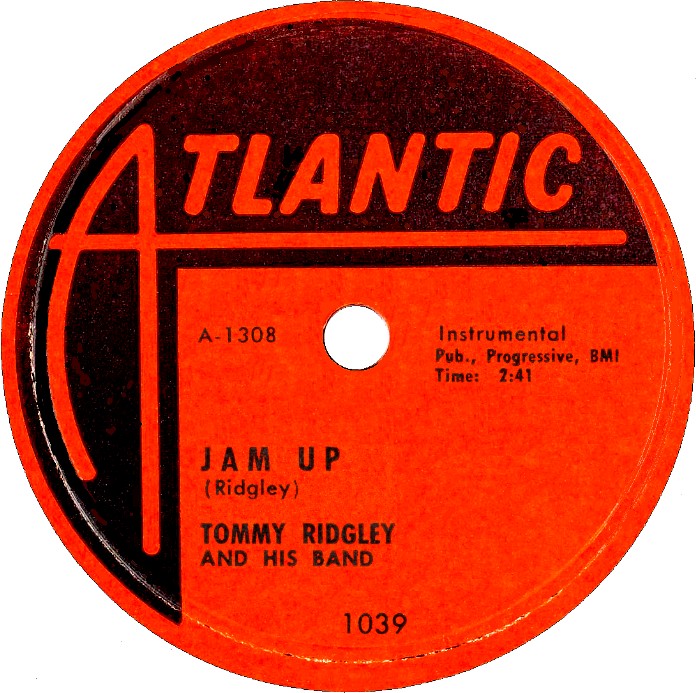
|
Above Left: Label image for Imperial 5198, released in 1952. Multitracked singing is utilized on this side. The flip-side is "Lavinia". Tommy "talks" through the ending on this one. The labels show Ridgley and Bartholomew as composers on both sides. Above Right: Label image for Atlantic 1039, released in 1954. The flip-side is "Wish I Had Never", written by Gladys De Vore.
Cash Box Review (10/2/54):
TOMMY RIDGLEY — Atlantic 1039
Wish I Had Never (B) Tommy Ridgley does a potent job of warbling the blues as he handles this slow tempo item with feeling. Ridgley bemoans his unsuccessful romance in a strong vocal backed with the swaying blues instrumental backing.
Jam Up (C+) Ridgley dishes up a driving quick beat instrumental punctuated by side-comments. Ork really moves as does the tune. A Ridgley piece of material.
(NOTE: A rating of B was considered as "very good" and C+ as "good".)LISTEN (Windows Media Player):
1. "I Live My Life" - Tommy Ridgley - Imperial 5198 - 1952.
2. "Lavinia" - Tommy Ridgley - Imperial 5198 - 1952.
3. "Jam Up" - Tommy Ridgley - Atlantic 1039 - 1954.
4. "Wish I Had Never" - Tommy Ridgley - Atlantic 1039 - 1954.ALL FOUR SONGS played in sequence.
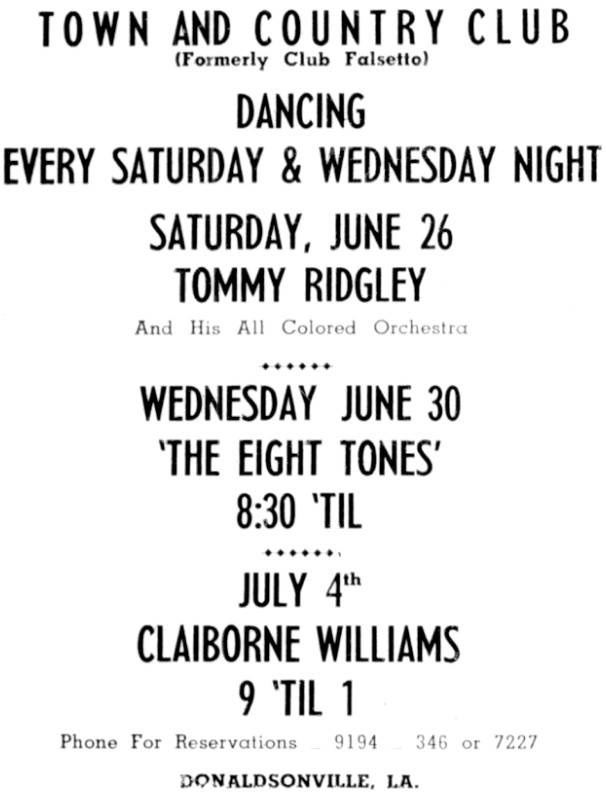
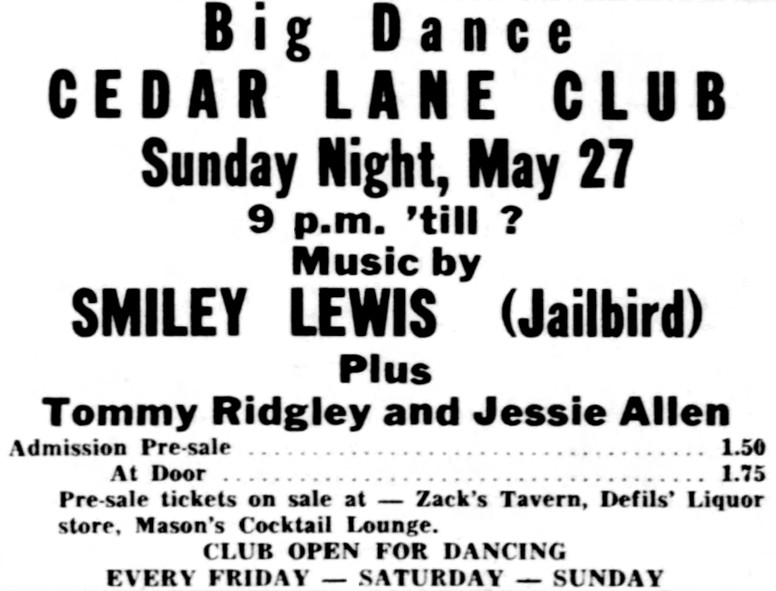
At Left: IBERVILLE PARISH TIMES (White Castle, LA), June 25, 1954.
Above: DAILY WORLD (Opelousas, LA), May 15, 1955.
(NOTE: Ridgley, Lewis, and Allen all had been artists with releases on Imperial Records. Jessie Allen and more Smiley Lewis will be included in Part Three of this article.)
IMPERIAL RECORDS - PART ONE FEATURES LALO GUERRERO, DICK LEWIS AND HIS HARLEM RHYTHM BOYS, "POISON" GARDNER, "FAT MAN" HAMILTON, CHARLIE "BOOGIE WOOGIE" DAVIS, KING (JAKE) PORTER, DOROTHY ELLIS, STASH CARTER, JOE TURNER, ARCHIBALD, AND FATS DOMINO. IMPERIAL RECORDS - PART THREE FEATURES SMILEY LEWIS, SLIM WHITMAN, FATS DOMINO, BOBBY MITCHELL AND THE TOPPERS, DAVE BARTHOLOMEW, THE LOVE NOTES, ROSE MITCHELL, JESSE ALLEN, AUDREY WALKER, AND GUITAR SLIM.
IMPERIAL RECORDS - PART FOUR FEATURES FATS DOMINO, GENE GILMORE, LITTLE BOOKER, PEE WEE CRAYTON, THE SPIDERS, THE HAWKS, THE PELICANS, AND THE KIDDS.
IMPERIAL RECORDS - PART FIVE FEATURES THE JEWELS, ROOSEVELT SYKES, THE BARONS, THE HONEY BEES, THE GAY NOTES, ROY BROWN, AND RICKY NELSON. ALSO, AFFILIATED LABELS AND IMPERIAL'S GOSPEL. HIGHLIGHTED SONGS ARE "LET THE FOUR WINDS BLOW" AND "GOOD ROCKING TONIGHT".
Listen to all of this article's R&B audio selections using Windows Media Player:
|
1. "Careless Love" - Fats Domino - Imperial 5145 - 1951.
2. "Rockin' Chair" - Fats Domino - Imperial 5145 - 1951. 3. "Goin' Home" - Fats Domino - Imperial 5180 - 1952. 4. "Reeling And Rocking" - Fats Domino - Imperial 5180 - 1952. 5. "Going To The River" - Fats Domino Imperial 5231 - 1953. 6. "Please Don't Leave Me" - Fats Domino - Imperial 5240 - 1953. 7. "Going To The River" - Chuck Willis - OKeh 6952 - 1953. 8. "Come Home" - Cecil Gant - Imperial 5112 - 1950. 9. "Blues By Cecil" - Cecil Gant - Imperial 5112 - 1950. 10. "I Wonder" - Cecil Gant - Gilt-Edge 5090 - 1944. 11. "I Wonder" - Cecil Gant Trio - Bullet 272 B - 1947. 12. "Boozie Boogie (Instrumental)" - Cecil Gant Orchestra - Bullet 264 B - 1947. 13. "Time Changes Things" - Lil' Son Jackson - Imperial 5131 - 1951. 14. "Mr. Blues" - Lil' Son Jackson - Imperial 5131 - 1951. 15. "Aching Heart" - Lil' Son Jackson - Imperial 5144 - 1951. 16. "Red Light" - Lil' Son Jackson (Vocal Backing By Band) - Imperial 5144 - 1951. 17. "Homeless" - Little Son Jackson - Dot 1051-B - 1951. 18. "Gambling Blues" - Little Son Jackson - Dot 1051-A - 1951. 19. "Welcome Blues" - T-Bone Walker - Imperial 5147 - 1951. 20. "Cold Cold Feeling" - T-Bone Walker - Imperial 5171 - 1952. 21. "Strugglin' Blues" - T-Bone Walker - Imperial 5299 - 1954. 22. "That Old Feelin' Is Gone" - T-Bone Walker And His Guitar - Comet T52A - 1949. 23. "Description Blues" - T-Bone Walker And His Guitar - Comet T52B - 1949. 24. "She Is Going To Ruin Me (Vocal Backing By Band)" - T-Bone Walker - Old Swing-Master 11B - 1949. 25. "Tee-Nah-Nah" - Smiley Lewis And His Sextet - Imperial 5067 - 1950. 26. "Tee Nah Nah" - Van "Piano Man" Walls And His After Hour Session Boys - Atlantic 904 - 1950. 27. "Lillie Mae" - Smiley Lewis (Vocal Backing By Band) - Imperial 5194 - 1952. 28. "The Bells Are Ringing" - Smiley Lewis - Imperial 5194 - 1952. 29. "Jessie Mae's Blues " - Jessie Mae Robinson With Monte Easter Orchestra - Discovery 1203 - 1952. 30. "I'm Hunched" - Mary Wallace - Imperial 5168 - 1952. 31. "Real Fine Daddy" - Mary Wallace - Imperial 5168 - 1952. 32. "Deacon Rides Again" - Big Jay McNeeley - Imperial 5170 - 1952. 33. "Blow, Blow, Blow (Instrumental)" - Big Jay McNeeley - Imperial 5170 - 1952. 34. "Ace Of Clubs (Instrumental)" - Joe Houston - Imperial 5183 - 1952. 35. "Jump The Blues" - Joe Houston - Imperial 5183 - 1952. 36. "Hurricane (Instrumental)" - Joe Houston - Imperial 5196 - 1952. 37. "Bobby Sox Ramble (Instrumental)" - Joe Houston - Imperial 5196 - 1952. 38. "I Live My Life" - Tommy Ridgley - Imperial 5198 - 1952. 39. "Lavinia" - Tommy Ridgley - Imperial 5198 - 1952. 40. "Jam Up" - Tommy Ridgley - Atlantic 1039 - 1954. 41. "Wish I had Never" - Tommy Ridgley - Atlantic 1039 - 1954. ALL FORTY-ONE ABOVE SONGS played in sequence. ALL TWENTY-EIGHT ABOVE IMPERIAL LABEL SONGS played in sequence.
|
Last Update: April 13, 2023
E-mail Me: